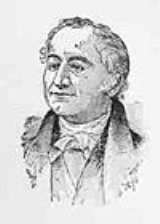
List of United States Senators from New Jersey
Encyclopedia
This is a chronological listing of the United States Senators from New Jersey. United States Senators
are popularly elected, for a six-year term beginning January 3. Elections are held the first Tuesday after November 1. Before 1914, they were chosen by the New Jersey Legislature
, and before 1935, their terms began March 4. The current Senators are Democrats Bob Menendez and Frank Lautenberg
.
belong to the electoral cycle that were elected for one session of the U.S. Congress in the first election of 1788 and whose seats in recent years are contested in 1994
, 2000
, 2006, and 2012
.
belong to the electoral cycle that were elected for two sessions of the U.S. Congress in the first election of 1788 and whose seats in recent years are contested in 1996
, 2002
, 2008
, and 2014
.
United States Senate
The United States Senate is the upper house of the bicameral legislature of the United States, and together with the United States House of Representatives comprises the United States Congress. The composition and powers of the Senate are established in Article One of the U.S. Constitution. Each...
are popularly elected, for a six-year term beginning January 3. Elections are held the first Tuesday after November 1. Before 1914, they were chosen by the New Jersey Legislature
New Jersey Legislature
The New Jersey Legislature is the legislative branch of the government of the U.S. state of New Jersey. In its current form, as defined by the New Jersey Constitution of 1947, the Legislature consists of two houses: the General Assembly and the Senate...
, and before 1935, their terms began March 4. The current Senators are Democrats Bob Menendez and Frank Lautenberg
Frank Lautenberg
Frank Raleigh Lautenberg is the senior United States Senator from New Jersey and a member of the Democratic Party. Previously, he was the Chairman and Chief Executive Officer of Automatic Data Processing, Inc.-Early life, career, and family:...
.
Class 1
Class 1 senatorsClasses of United States Senators
The three classes of United States Senators are currently made up of 33 or 34 Senate seats. The purpose of the classes is to determine which Senate seats will be up for election in a given year. The three groups are staggered so that one of them is up for election every two years.A senator's...
belong to the electoral cycle that were elected for one session of the U.S. Congress in the first election of 1788 and whose seats in recent years are contested in 1994
United States Senate election in New Jersey, 1994
The 1994 United States Senate Election in New Jersey was held on November 8, 1994. Incumbent Democratic U.S. Senator Frank Lautenberg won re-election to a third term.-Results:...
, 2000
United States Senate election in New Jersey, 2000
The 2000 United States Senate election in New Jersey was held on November 7, 2000. Incumbent Democratic U.S. Senator Frank Lautenberg decided to retire, instead of seeking a fourth term. Democrat nominee, former CEO of Goldman Sachs Jon Corzine defeated Republican nominee, U.S. Congressman Bob...
, 2006, and 2012
United States Senate elections, 2012
Elections to the United States Senate are to be held on November 6, 2012, with 33 of the 100 seats in the Senate being contested in regular elections whose winners will serve six-year terms from January 3, 2013 until January 3, 2019. Additionally, special elections may be held to fill vacancies...
.
| # | Senator | Party | Years | Congress | Term | Electoral history |
|---|---|---|---|---|---|---|
| 1 |  Jonathan Elmer Jonathan ElmerJonathan Elmer Jonathan Elmer was an American politician, of the Pro-Administration Party.Elmer was born in Cedarville, New Jersey in 1745. He was graduated from the University of Pennsylvania in 1769 after studying medicine. He practiced medicine in Bridgeton, New Jersey until he became sheriff of Cumberland... |
Pro- Administration Pro-Administration Party (United States) Pro-Administration "Party" is a term by historians to describe the supporters of the policies of George Washington's administration — especially Treasury Secretary Alexander Hamilton's financial policies — prior to the formation of the Federalist and Democratic-Republican Parties.Almost the entire... |
March 4, 1789 – March 3, 1791 |
1 1st United States Congress -House of Representatives:During this congress, five House seats were added for North Carolina and one House seat was added for Rhode Island when they ratified the Constitution.-Senate:* President: John Adams * President pro tempore: John Langdon... |
1 | Elected in 1789 |
| 2 | 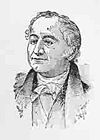 John Rutherfurd John RutherfurdJohn Rutherfurd John Rutherfurd was an American politician and land surveyor.John Rutherfurd was born in New York City. His parents were Walter and Mary Rutherfurd. Walter was a veteran of the British Army, and was a hostage of Patriots during the Revolutionary War while John was a teenager. Walter died in 1804... |
Federalist Federalist Party (United States) The Federalist Party was the first American political party, from the early 1790s to 1816, the era of the First Party System, with remnants lasting into the 1820s. The Federalists controlled the federal government until 1801... |
March 4, 1791 – December 5, 1798 |
2 2nd United States Congress -House of Representatives:During this congress, two new House seats were added for each of the new states of Vermont and Kentucky. -Leadership:-Senate:*President: John Adams *President pro tempore:** Richard Henry Lee... |
2 | Elected in 1790 United States Senate elections, 1790 The United States Senate elections of 1790 was the second election of Senators in the United States. In this election, terms were up for the nine Senators in Class 1... |
| 3 3rd United States Congress The Third United States Congress was a meeting of the legislative branch of the United States federal government, consisting of the United States Senate and the United States House of Representatives... |
||||||
| 4 4th United States Congress -House of Representatives:- Senate :* President: John Adams * President pro tempore:** Henry Tazewell , first elected December 7, 1795** Samuel Livermore , first elected May 6, 1796** William Bingham , first elected February 16, 1797... |
||||||
| 5 5th United States Congress The Fifth United States Congress was a meeting of the legislative branch of the United States federal government, consisting of the United States Senate and the United States House of Representatives... |
3 | Re-elected in 1796 United States Senate elections, 1796 The United States Senate election of 1796 was an election for the United States Senate which, coinciding with John Adams's election as President, had the ruling Federalist Party gain one seat.... Resigned for unclear reasons. |
||||
| 3 | 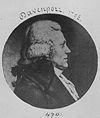 Franklin Davenport Franklin DavenportFranklin Davenport Franklin Davenport was a Federalist Party US Senator and US Representative from New Jersey.-Biography:Davenport was born in Philadelphia, Pennsylvania and his uncle was Benjamin Franklin... |
Federalist Federalist Party (United States) The Federalist Party was the first American political party, from the early 1790s to 1816, the era of the First Party System, with remnants lasting into the 1820s. The Federalists controlled the federal government until 1801... |
December 5, 1798 – March 3, 1799 |
Appointed to continue Rutherfurd's term |
||
| 4 | 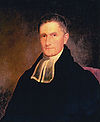 James Schureman James SchuremanJames Schureman James Schureman was an American merchant and statesman from New Brunswick, New Jersey. He represented New Jersey in the Continental Congress as well as the United States House of Representatives and United States Senate.... |
Federalist Federalist Party (United States) The Federalist Party was the first American political party, from the early 1790s to 1816, the era of the First Party System, with remnants lasting into the 1820s. The Federalists controlled the federal government until 1801... |
March 4, 1799 – February 16, 1801 |
6 6th United States Congress The Sixth United States Congress was a meeting of the legislative branch of the United States federal government, consisting of the United States Senate and the United States House of Representatives. It met at Congress Hall in Philadelphia, Pennsylvania and in Washington, D.C. from March 4, 1799... |
Elected to finish Rutherfurd's term Resigned |
|
| Vacant | ||||||
| 5 | 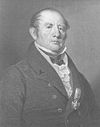 Aaron Ogden Aaron OgdenAaron Ogden Aaron Ogden was a United States Senator and the 5th Governor of New Jersey.-Early life:Ogden was born in Elizabeth, New Jersey... |
Federalist Federalist Party (United States) The Federalist Party was the first American political party, from the early 1790s to 1816, the era of the First Party System, with remnants lasting into the 1820s. The Federalists controlled the federal government until 1801... |
February 28, 1801 – March 3, 1803 |
6 6th United States Congress The Sixth United States Congress was a meeting of the legislative branch of the United States federal government, consisting of the United States Senate and the United States House of Representatives. It met at Congress Hall in Philadelphia, Pennsylvania and in Washington, D.C. from March 4, 1799... (Continued) |
Elected to finish Schureman's term Lost re-election |
|
| 7 7th United States Congress - House of Representatives :-Senate:* President: Aaron Burr * President pro tempore:** Abraham Baldwin , first elected December 7, 1801** Stephen R. Bradley , first elected December 14, 1802-House of Representatives:... |
||||||
| Vacant | March 3, 1803 – September 1, 1803 |
8 8th United States Congress - Senate :* President: Aaron Burr * President pro tempore: John Brown , October 17, 1803 – February 26, 1804** Jesse Franklin , March 10, 1804 – November 4, 1804** Joseph Anderson , January 15, 1805 – December 1, 1805- House of Representatives :... |
4 | Legislature failed to elect | ||
| 6 | 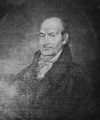 John Condit John ConditJohn Condit John Condit was a United States Representative and a United States Senator from New Jersey and father of United States Representative Silas Condit.... |
Democratic- Republican Democratic-Republican Party (United States) The Democratic-Republican Party or Republican Party was an American political party founded in the early 1790s by Thomas Jefferson and James Madison. Political scientists use the former name, while historians prefer the latter one; contemporaries generally called the party the "Republicans", along... |
September 1, 1803 – March 3, 1809 |
8 8th United States Congress - Senate :* President: Aaron Burr * President pro tempore: John Brown , October 17, 1803 – February 26, 1804** Jesse Franklin , March 10, 1804 – November 4, 1804** Joseph Anderson , January 15, 1805 – December 1, 1805- House of Representatives :... (Continued) |
Appointed to continue the term left vacant by the failure of the legislature to elect Elected to finish the term left vacant by the failure of the legislature to elect |
|
| 9 9th United States Congress - Senate :* President: George Clinton * President pro tempore: Samuel Smith - House of Representatives :* Speaker: Nathaniel Macon -Members:This list is arranged by chamber, then by state... |
||||||
| 10 10th United States Congress - House of Representatives :- Senate :*President: George Clinton *President pro tempore: Samuel Smith , elected April 16, 1808** Stephen R. Bradley , elected December 28, 1808** John Milledge , elected January 30, 1809... |
||||||
| 7 | 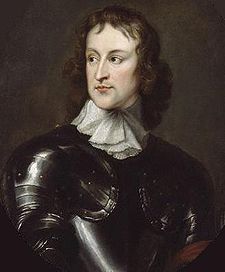 John Lambert John LambertJohn Lambert (politician) John Lambert , was a New Jersey politician who served as a Representative, a U.S. Senator and as Acting Governor of New Jersey.... |
Democratic- Republican Democratic-Republican Party (United States) The Democratic-Republican Party or Republican Party was an American political party founded in the early 1790s by Thomas Jefferson and James Madison. Political scientists use the former name, while historians prefer the latter one; contemporaries generally called the party the "Republicans", along... |
March 4, 1809 – March 3, 1815 |
11 11th United States Congress - House of Representatives :-Leadership:- Senate :* President: George Clinton * President pro tempore:** John Milledge ** Andrew Gregg , elected June 26, 1809** John Gaillard , elected February 28, 1810... |
5 | Elected in 1809 |
| 12 12th United States Congress - House of Representatives :During this congress, one new House seat was added for the new state of Louisiana.- Senate :*President: George Clinton *President pro tempore: William H. Crawford -House of Representatives:*Speaker: Henry Clay... |
||||||
| 13 13th United States Congress - Senate :* President: Elbridge Gerry , until November 23, 1814, thereafter vacant.* President pro tempore: Joseph B. Varnum , December 6, 1813 – February 3, 1814** John Gaillard , elected November 25, 1814- House of Representatives :... |
||||||
| 8 |  James J. Wilson James J. WilsonJames J. Wilson James Jefferson Wilson served New Jersey as a U.S. Senator from 1815 to 1821.-Biography:Wilson was born in Essex County, New Jersey, where he attended the common schools... |
Democratic- Republican Democratic-Republican Party (United States) The Democratic-Republican Party or Republican Party was an American political party founded in the early 1790s by Thomas Jefferson and James Madison. Political scientists use the former name, while historians prefer the latter one; contemporaries generally called the party the "Republicans", along... |
March 4, 1815 – January 8, 1821 |
14 14th United States Congress - Senate :* President: Vacant* President pro tempore: John Gaillard of South Carolina, first elected December 4, 1815- House of Representatives :* Speaker: Henry Clay of Kentucky-Members:This list is arranged by chamber, then by state... |
6 | Elected in 1815 Lost re-election, and resigned early |
| 15 15th United States Congress -Leadership:- Senate :* President: Daniel D. Tompkins * President pro tempore:** John Gaillard , elected March 4, 1817** James Barbour , elected February 15, 1819- House of Representatives :*Speaker: Henry Clay -Members:... |
||||||
| 16 16th United States Congress -House of Representatives:During this congress, one House seat was added for the new state of Alabama and one seat was reapportioned from Massachusetts to the new state of Maine. For the beginning of the next congress, six more seats from Massachusetts would be reapportioned to... |
||||||
| Vacant | January 8, 1821 – January 26, 1821 |
|||||
| 9 | Samuel L. Southard Samuel L. Southard Samuel Lewis Southard was a prominent U.S. statesman of the early 19th century, serving as a U.S. Senator, Secretary of the Navy, and the 10th Governor of New Jersey.-History:... |
Democratic- Republican Democratic-Republican Party (United States) The Democratic-Republican Party or Republican Party was an American political party founded in the early 1790s by Thomas Jefferson and James Madison. Political scientists use the former name, while historians prefer the latter one; contemporaries generally called the party the "Republicans", along... |
January 26, 1821 – March 3, 1823 |
16 16th United States Congress -House of Representatives:During this congress, one House seat was added for the new state of Alabama and one seat was reapportioned from Massachusetts to the new state of Maine. For the beginning of the next congress, six more seats from Massachusetts would be reapportioned to... (Continued) |
Appointed to finish Wilson's term, having been elected to the next term |
|
| 17 17th United States Congress The Seventeenth United States Congress was a meeting of the legislative branch of the United States federal government, consisting of the United States Senate and the United States House of Representatives. It met in Washington, D.C. from March 4, 1821 to March 3, 1823, during the fifth and sixth... |
7 | Elected in 1821 Resigned to become U.S. Secretary of the Navy United States Secretary of the Navy The Secretary of the Navy of the United States of America is the head of the Department of the Navy, a component organization of the Department of Defense... |
||||
| Vacant | March 4, 1823 – November 12, 1823 |
18 18th United States Congress The Eighteenth United States Congress was a meeting of the legislative branch of the United States federal government, consisting of the United States Senate and the United States House of Representatives. It met in Washington, D.C. from March 4, 1823 to March 3, 1825, during the seventh and eighth... |
||||
| 10 | 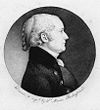 Joseph McIlvaine Joseph McIlvaineJoseph McIlvaine Joseph McIlvaine was a United States Senator from New Jersey from 1823 until his death.-Early life and career:McIlvaine was born in Bristol, Pennsylvania to Col. Joseph Mcllvaine and Catherine Swan... |
Adams Republican Democratic-Republican Party (United States) The Democratic-Republican Party or Republican Party was an American political party founded in the early 1790s by Thomas Jefferson and James Madison. Political scientists use the former name, while historians prefer the latter one; contemporaries generally called the party the "Republicans", along... |
November 12, 1823 – August 19, 1826 |
18 18th United States Congress The Eighteenth United States Congress was a meeting of the legislative branch of the United States federal government, consisting of the United States Senate and the United States House of Representatives. It met in Washington, D.C. from March 4, 1823 to March 3, 1825, during the seventh and eighth... (Continued) |
Elected to finish Southard's term Died |
|
| Anti- Jacksonian |
19 19th United States Congress -House of Representatives:-Leadership:- Senate :* President: John C. Calhoun * President pro tempore: John Gaillard , until December 4, 1825** Nathaniel Macon , from May 20, 1826- House of Representatives :* Speaker: John W. Taylor -Members:... |
|||||
| Vacant | August 19, 1826 – November 10, 1826 |
|||||
| 11 | 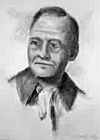 Ephraim Bateman Ephraim BatemanEphraim Bateman Ephraim Bateman represented New Jersey in the United States Senate from 1826 to 1829 and in the United States House of Representatives from 1815-1823.... |
Anti- Jacksonian |
November 10, 1826 – January 12, 1829 |
19 19th United States Congress -House of Representatives:-Leadership:- Senate :* President: John C. Calhoun * President pro tempore: John Gaillard , until December 4, 1825** Nathaniel Macon , from May 20, 1826- House of Representatives :* Speaker: John W. Taylor -Members:... (Continued) |
Elected to finish McIlvaine's term | |
| Adams | 20 20th United States Congress -House of Representatives:-Leadership:- Senate :* President: John C. Calhoun * President pro tempore: Samuel Smith - House of Representatives :* Speaker: Andrew Stevenson -Members:This list is arranged by chamber, then by state... |
8 | Elected to full term in 1826 United States Senate elections, 1826 The United States Senate election of 1826 was an election which had the majority Jacksonian coalition gain a seat in the United States Senate.As this election was prior to ratification of the seventeenth amendment, Senators were chosen by State legislatures.... Resigned because of failing health |
|||
| Vacant | January 12, 1829 – January 30, 1829 |
|||||
| 12 |  Mahlon Dickerson Mahlon DickersonMahlon Dickerson Mahlon Dickerson was an American judge and politician. He was elected Governor of New Jersey as well as United States Senator from that state. He was twice appointed Secretary of the Navy - under Presidents Andrew Jackson and Martin van Buren... |
Jacksonian | January 30, 1829 – March 3, 1833 |
20 20th United States Congress -House of Representatives:-Leadership:- Senate :* President: John C. Calhoun * President pro tempore: Samuel Smith - House of Representatives :* Speaker: Andrew Stevenson -Members:This list is arranged by chamber, then by state... (Continued) |
Elected to finish Bateman's term |
|
| 21 21st United States Congress -House of Representatives:-Leadership:- Senate :* President: John C. Calhoun * President pro tempore: Samuel Smith - House of Representatives :* Speaker: Andrew Stevenson -Members:This list is arranged by chamber, then by state... |
||||||
| 22 22nd United States Congress -House of Representatives:-Leadership:- Senate :* President:** John C. Calhoun , resigned December 28, 1832, thereafter vacant.* President pro tempore:** Samuel Smith , first elected December 5, 1831** Littleton W... |
||||||
| 13 | Samuel L. Southard Samuel L. Southard Samuel Lewis Southard was a prominent U.S. statesman of the early 19th century, serving as a U.S. Senator, Secretary of the Navy, and the 10th Governor of New Jersey.-History:... |
Anti- Jacksonian |
March 4, 1833 – June 26, 1842 |
23 23rd United States Congress -House of Representatives:For the beginning of this congress, the size of the House was increased from 213 seats to 240 seats, following the 1830 United States Census .- Leadership :- Senate :* President: Martin Van Buren... |
9 | Elected in 1833 |
| 24 24th United States Congress -House of Representatives:During this congress one House seat was added for each of the new states of Arkansas and Michigan.-Leadership:- Senate :* President: Martin Van Buren * President pro tempore: William R. King - House of Representatives :... |
||||||
| Whig Whig Party (United States) The Whig Party was a political party of the United States during the era of Jacksonian democracy. Considered integral to the Second Party System and operating from the early 1830s to the mid-1850s, the party was formed in opposition to the policies of President Andrew Jackson and his Democratic... |
25 25th United States Congress -House of Representatives:-Leadership:- Senate :* President: Richard Mentor Johnson * President pro tempore: William R. King - House of Representatives :* Speaker: James K. Polk -Members:This list is arranged by chamber, then by state... |
|||||
| 26 26th United States Congress -House of Representatives:- Leadership :- Senate :*President: Richard M. Johnson *President pro tempore: William R. King - House of Representatives :*Speaker: Robert M.T. Hunter -Members:This list is arranged by chamber, then by state... |
10 | Re-elected in 1839 Resigned due to failing health |
||||
| 27 27th United States Congress The Twenty-seventh United States Congress was a meeting of the legislative branch of the United States federal government, consisting of the United States Senate and the United States House of Representatives. It met in Washington, D.C. from March 4, 1841 to March 3, 1843, during the one-month... |
||||||
| Vacant | June 26, 1842 – July 2, 1842 |
|||||
| 14 | 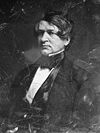 William L. Dayton William L. DaytonWilliam L. Dayton William Lewis Dayton was an American politician.A distant relation of U.S. House Speaker and U.S. Constitution signatory Jonathan Dayton, he was born in Basking Ridge, New Jersey to farmer Joel Dayton and his wife... |
Whig Whig Party (United States) The Whig Party was a political party of the United States during the era of Jacksonian democracy. Considered integral to the Second Party System and operating from the early 1830s to the mid-1850s, the party was formed in opposition to the policies of President Andrew Jackson and his Democratic... |
July 2, 1842 – March 3, 1851 |
27 27th United States Congress The Twenty-seventh United States Congress was a meeting of the legislative branch of the United States federal government, consisting of the United States Senate and the United States House of Representatives. It met in Washington, D.C. from March 4, 1841 to March 3, 1843, during the one-month... (Continued) |
Appointed to continue Southard's term Elected to finish Southard's term |
|
| 28 28th United States Congress -House of Representatives:Following the 1840 United States Census, Congress reapportioned the House to include 223 seats . During this congress, one House seat was added for the new state of Florida .- Senate :*President: Vacant... |
||||||
| 29 29th United States Congress -House of Representatives:During this congress, two House seats were added for each of the new states of Texas and Iowa.-Leadership:-Senate:* President: George M. Dallas * President pro tempore: Willie P. Mangum... |
11 | Re-elected in 1845 Lost re-election |
||||
| 30 30th United States Congress The Thirtieth United States Congress was a meeting of the legislative branch of the United States federal government, consisting of the United States Senate and the United States House of Representatives. It met in Washington, D.C. from March 4, 1847 to March 3, 1849, during the last two years of... |
||||||
| 31 31st United States Congress The Thirty-first United States Congress was a meeting of the legislative branch of the United States federal government, consisting of the United States Senate and the United States House of Representatives. It met in Washington, D.C. from March 4, 1849 to March 3, 1851, during the last 17 months... |
||||||
| 15 | 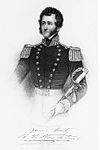 Robert F. Stockton Robert F. StocktonRobert F. Stockton Robert Field Stockton was a United States naval commodore, notable in the capture of California during the Mexican-American War. He was a naval innovator and an early advocate for a propeller-driven, steam-powered navy. Stockton was from a notable political family and also served as a U.S... |
Democratic Democratic Party (United States) The Democratic Party is one of two major contemporary political parties in the United States, along with the Republican Party. The party's socially liberal and progressive platform is largely considered center-left in the U.S. political spectrum. The party has the lengthiest record of continuous... |
March 4, 1851 – January 10, 1853 |
32 32nd United States Congress The Thirty-second United States Congress was a meeting of the legislative branch of the United States federal government, consisting of the United States Senate and the United States House of Representatives. It met in Washington, D.C. from March 4, 1851 to March 3, 1853, during the third and... |
12 | Elected in 1851 Resigned to become president of the Delaware and Raritan Canal Company |
| Vacant | January 10, 1853 – March 4, 1853 |
|||||
| 16 | 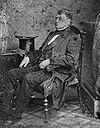 John Renshaw Thomson John Renshaw ThomsonJohn Renshaw Thomson John Renshaw Thomson was an American merchant and politician from New Jersey.-Life:Born in Philadelphia, Pennsylvania, he attended the common schools in Princeton, New Jersey, and the College of New Jersey . In 1817, he went to China and became a merchant in Canton where he was United States... |
Democratic Democratic Party (United States) The Democratic Party is one of two major contemporary political parties in the United States, along with the Republican Party. The party's socially liberal and progressive platform is largely considered center-left in the U.S. political spectrum. The party has the lengthiest record of continuous... |
March 4, 1853 – September 12, 1862 |
33 33rd United States Congress The Thirty-third United States Congress was a meeting of the legislative branch of the United States federal government, consisting of the United States Senate and the United States House of Representatives. It met in Washington, D.C. from March 4, 1853 to March 3, 1855, during the first two years... |
Elected to finish Stockton's term | |
| 34 34th United States Congress The Thirty-fourth United States Congress was a meeting of the legislative branch of the United States federal government, consisting of the United States Senate and the United States House of Representatives. It met in Washington, D.C. from March 4, 1855 to March 4, 1857, during the last two years... |
||||||
| 35 35th United States Congress The 35th United States Congress was a meeting of the legislative branch of the United States federal government, consisting of the United States Senate and the United States House of Representatives. It met in Washington, D.C. from March 4, 1857 to March 3, 1859, during the first two years of James... |
13 | Re-elected in 1858 United States Senate elections, 1858 The United States Senate election of 1858 was an election which had the Republican Party gain six additional seats in the United States Senate.As this election was prior to ratification of the seventeenth amendment, Senators were chosen by State legislatures.... Died |
||||
| 36 36th United States Congress The Thirty-sixth United States Congress was a meeting of the legislative branch of the United States federal government, consisting of the United States Senate and the United States House of Representatives. It met in Washington, D.C. from March 4, 1859 to March 4, 1861, during the third and fourth... |
||||||
| 37 37th United States Congress The Thirty-seventh United States Congress was a meeting of the legislative branch of the United States federal government, consisting of the United States Senate and the United States House of Representatives. It met in Washington, D.C. from March 4, 1861 to March 4, 1863, during the first two... |
||||||
| Vacant | September 12, 1862 – November 21, 1862 |
|||||
| 17 | 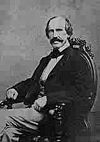 Richard Stockton Field Richard Stockton FieldRichard Stockton Field Richard Stockton Field was a United States Senator from New Jersey, and later a United States federal judge. Field was the great-grandson of Richard Stockton , New Jersey Delegate to the Continental Congress, and the grandson of Richard Stockton , US Senator from New Jersey.Born in White Hall,... |
Republican Republican Party (United States) The Republican Party is one of the two major contemporary political parties in the United States, along with the Democratic Party. Founded by anti-slavery expansion activists in 1854, it is often called the GOP . The party's platform generally reflects American conservatism in the U.S... |
November 21, 1862 – January 14, 1863 |
Appointed to continue Thomson's term Retired when successor elected |
||
| 18 | 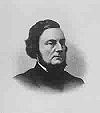 James Walter Wall James Walter WallJames Walter Wall James Walter Wall was a United States Senator from New Jersey during the American Civil War. He was the son of U.S. Senator Garret Dorset Wall.-Biography:... |
Democratic Democratic Party (United States) The Democratic Party is one of two major contemporary political parties in the United States, along with the Republican Party. The party's socially liberal and progressive platform is largely considered center-left in the U.S. political spectrum. The party has the lengthiest record of continuous... |
January 14, 1863 – March 3, 1863 |
|||
| 19 | 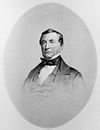 William Wright William Wright |
Democratic Democratic Party (United States) The Democratic Party is one of two major contemporary political parties in the United States, along with the Republican Party. The party's socially liberal and progressive platform is largely considered center-left in the U.S. political spectrum. The party has the lengthiest record of continuous... |
March 4, 1863 – November 1, 1866 |
38 38th United States Congress -House of Representatives:Before this Congress, the 1860 United States Census and resulting reapportionment changed the size of the House to 241 members... |
14 | Elected in 1863 Died |
| 39 39th United States Congress The Thirty-ninth United States Congress was a meeting of the legislative branch of the United States federal government, consisting of the United States Senate and the United States House of Representatives. It met in Washington, D.C. from March 4, 1865 to March 4, 1867, during the first month of... |
||||||
| Vacant | November 1, 1866 – November 12, 1866 |
|||||
| 20 |  Frederick T. Frelinghuysen Frederick T. Frelinghuysen |
Republican Republican Party (United States) The Republican Party is one of the two major contemporary political parties in the United States, along with the Democratic Party. Founded by anti-slavery expansion activists in 1854, it is often called the GOP . The party's platform generally reflects American conservatism in the U.S... |
November 12, 1866 – March 3, 1869 |
39 39th United States Congress The Thirty-ninth United States Congress was a meeting of the legislative branch of the United States federal government, consisting of the United States Senate and the United States House of Representatives. It met in Washington, D.C. from March 4, 1865 to March 4, 1867, during the first month of... (Continued) |
Appointed to continue Wright's term Elected to finish Wright's term Lost re-election |
|
| 40 40th United States Congress The Fortieth United States Congress was a meeting of the legislative branch of the United States federal government, consisting of the United States Senate and the United States House of Representatives. It met in Washington, D.C. from March 4, 1867 to March 4, 1869, during the third and fourth... |
||||||
| 21 | 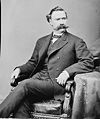 John P. Stockton John P. StocktonJohn P. Stockton John Potter Stockton was a New Jersey politician who served in the United States Senate as a Democrat.Born in Princeton, New Jersey, Stockton was the son of Robert F. Stockton, grandson of Richard Stockton and the great-grandson of Richard Stockton , both prominent New Jersey politicians... |
Democratic Democratic Party (United States) The Democratic Party is one of two major contemporary political parties in the United States, along with the Republican Party. The party's socially liberal and progressive platform is largely considered center-left in the U.S. political spectrum. The party has the lengthiest record of continuous... |
March 4, 1869 – March 3, 1875 |
41 41st United States Congress -House of Representatives:- Senate :* President : Schuyler Colfax* President pro tempore: Henry B. Anthony - House of Representatives :* Speaker: James G. Blaine -Members:This list is arranged by chamber, then by state... |
15 | Elected in 1869 |
| 42 42nd United States Congress The Forty-second United States Congress was a meeting of the legislative branch of the United States federal government, consisting of the United States Senate and the United States House of Representatives. It met in Washington, D.C. from March 4, 1871 to March 3, 1873, during the third and fourth... |
||||||
| 43 43rd United States Congress The Forty-third United States Congress was a meeting of the legislative branch of the United States federal government, consisting of the United States Senate and the United States House of Representatives. It met in Washington, D.C. from March 4, 1873 to March 4, 1875, during the fifth and sixth... |
||||||
| 22 | 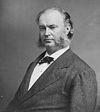 Theodore F. Randolph Theodore F. RandolphTheodore Fitz Randolph Theodore Fitz Randolph was an American Democratic Party politician, who served as the 22nd Governor of New Jersey from 1869 to 1872, and represented the state in the United States Senate for a single term, from 1875 to 1881. He was the son of US Representative James F... |
Democratic Democratic Party (United States) The Democratic Party is one of two major contemporary political parties in the United States, along with the Republican Party. The party's socially liberal and progressive platform is largely considered center-left in the U.S. political spectrum. The party has the lengthiest record of continuous... |
March 4, 1875 – March 3, 1881 |
44 44th United States Congress The Forty-fourth United States Congress was a meeting of the legislative branch of the United States federal government, consisting of the United States Senate and the United States House of Representatives. It met in Washington, D.C. from March 4, 1875 to March 4, 1877, during the seventh and... |
16 | Elected in 1875 |
| 45 45th United States Congress -House of Representatives:-Leadership:-Senate:*President: William A. Wheeler *President pro tempore: Thomas W. Ferry -House of Representatives:*Speaker: Samuel J. Randall -Members:This list is arranged by chamber, then by state... |
||||||
| 46 46th United States Congress The Forty-sixth United States Congress was a meeting of the legislative branch of the United States federal government, consisting of the United States Senate and the United States House of Representatives. It met in Washington, D.C. from March 4, 1879 to March 4, 1881, during the last two years of... |
||||||
| 23 | 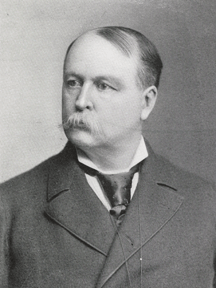 William Joyce Sewell William Joyce SewellWilliam Joyce Sewell William Joyce Sewell was born in Castlebar, County Mayo, Ireland immigrating to the United States in 1851 where he worked in the merchant industry in Chicago, Illinois before moving to Camden, New Jersey in 1860... |
Republican Republican Party (United States) The Republican Party is one of the two major contemporary political parties in the United States, along with the Democratic Party. Founded by anti-slavery expansion activists in 1854, it is often called the GOP . The party's platform generally reflects American conservatism in the U.S... |
March 4, 1881 – March 3, 1887 |
47 47th United States Congress The Forty-seventh United States Congress was a meeting of the legislative branch of the United States federal government, consisting of the United States Senate and the United States House of Representatives. It met in Washington, D.C. from March 4, 1881 to March 4, 1883, during the administration... |
17 | Elected in 1881 Lost re-election |
| 48 48th United States Congress The Forty-eighth United States Congress was a meeting of the legislative branch of the United States federal government, consisting of the United States Senate and the United States House of Representatives. It met in Washington, D.C. from March 4, 1883 to March 4, 1885, during the last two years... |
||||||
| 49 49th United States Congress The Forty-ninth United States Congress was a meeting of the legislative branch of the United States federal government, consisting of the United States Senate and the United States House of Representatives. It met in Washington, D.C. from March 4, 1885 to March 4, 1887, during the first two years... |
||||||
| 24 | 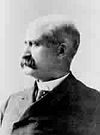 Rufus Blodgett Rufus BlodgettRufus Blodgett Rufus Blodgett was a US Senator from New Jersey and Superintendent of the New York & Long Branch Railroad for 25 years.-Biography:... |
Democratic Democratic Party (United States) The Democratic Party is one of two major contemporary political parties in the United States, along with the Republican Party. The party's socially liberal and progressive platform is largely considered center-left in the U.S. political spectrum. The party has the lengthiest record of continuous... |
March 4, 1887 – March 3, 1893 |
50 50th United States Congress The Fiftieth United States Congress was a meeting of the legislative branch of the United States federal government, consisting of the United States Senate and the United States House of Representatives. It met in Washington, D.C. from March 4, 1887 to March 4, 1889, during the third and fourth... |
18 | Elected in 1887 Retired |
| 51 51st United States Congress The Fifty-first United States Congress, referred to by some critics as the Billion Dollar Congress, was a meeting of the legislative branch of the United States federal government, consisting of the United States Senate and the United States House of Representatives. It met in Washington, D.C... |
||||||
| 52 52nd United States Congress The Fifty-second United States Congress was a meeting of the legislative branch of the United States federal government, consisting of the United States Senate and the United States House of Representatives. It met in Washington, D.C... |
||||||
| 25 | 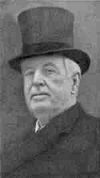 James Smith, Jr. James Smith, Jr.James Smith, Jr. James Smith, Jr. was a newspaper publisher and US Senator from New Jersey.-Biography:Born in Newark, New Jersey, Smith attended private schools and St. Mary's College, in Wilmington, Delaware. He was engaged in the dry-goods and importing business, and later became a manufacturer of leather in... |
Democratic Democratic Party (United States) The Democratic Party is one of two major contemporary political parties in the United States, along with the Republican Party. The party's socially liberal and progressive platform is largely considered center-left in the U.S. political spectrum. The party has the lengthiest record of continuous... |
March 4, 1893 – March 3, 1899 |
53 53rd United States Congress The Fifty-third United States Congress was a meeting of the legislative branch of the United States federal government, consisting of the United States Senate and the United States House of Representatives. It met in Washington, D.C. from March 4, 1893 to March 4, 1895, during the fifth and sixth... |
19 | Elected in 1893 Retired |
| 54 54th United States Congress - House of Representatives :-Leadership:- Senate :* President: Adlai E. Stevenson * President pro tempore: William P. Frye - Majority leadership :* Republican Conference Chairman: John Sherman- Minority leadership :... |
||||||
| 55 55th United States Congress -House of Representatives:* Republican: 206 * Democratic: 124* Populist: 22* Silver Republican: 3* Silver: 1* Independent Republican: 1TOTAL members: 357-Leadership:-Senate:* President: Garret Hobart * President pro tempore: William P... |
||||||
| 26 | 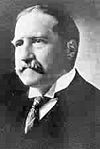 John Kean John KeanJohn Kean (New Jersey) John Kean was an American lawyer, banker and Republican Party politician from Elizabeth, New Jersey. He represented New Jersey in the U.S. Senate from 1899 to 1911 and served two separate terms in the United States House of Representatives, from 1883 to 1885, and from 1887 to 1889... |
Republican Republican Party (United States) The Republican Party is one of the two major contemporary political parties in the United States, along with the Democratic Party. Founded by anti-slavery expansion activists in 1854, it is often called the GOP . The party's platform generally reflects American conservatism in the U.S... |
March 4, 1899 – March 3, 1911 |
56 56th United States Congress -House of Representatives:- Leadership :- Senate :* President: Garret Hobart , until November 21, 1899 , vacant thereafter.* President pro tempore: William P. Frye * Democratic Caucus Chairman: James K. Jones... |
20 | Elected in 1899 |
| 57 57th United States Congress -House of Representatives:*Democratic: 151*Republican: 200 *Populist: 5*Silver : 1TOTAL members: 357-Leadership:-Senate:* President: Theodore Roosevelt , until September 14, 1901, vacant thereafter.... |
||||||
| 58 58th United States Congress - House of Representatives :* Republican : 209 * Democratic : 176* Silver Republican : 1TOTAL members: 386-Senate:* President: Vacant* President pro tempore: William P. Frye -Members:... |
||||||
| 59 59th United States Congress The Fifty-ninth United States Congress was a meeting of the legislative branch of the United States federal government, composed of the United States Senate and the United States House of Representatives. It met in Washington, DC from March 4, 1905 to March 4, 1907, during the fifth and sixth... |
21 | Re-elected in 1905 |
||||
| 60 60th United States Congress The Sixtieth United States Congress was a meeting of the legislative branch of the United States federal government, composed of the United States Senate and the United States House of Representatives. It met in Washington, DC from March 4, 1907 to March 4, 1909, during the last two years of... |
||||||
| 61 61st United States Congress The Sixty-first United States Congress was a meeting of the legislative branch of the United States federal government, composed of the United States Senate and the United States House of Representatives. It met in Washington, DC from March 4, 1909 to March 4, 1911, during the first two years of... |
||||||
| 27 | 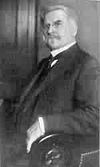 James Edgar Martine James Edgar MartineJames Edgar Martine James Edgar Martine was an American Democratic Party politician who served as United States Senator from New Jersey.-Biography:... |
Democratic Democratic Party (United States) The Democratic Party is one of two major contemporary political parties in the United States, along with the Republican Party. The party's socially liberal and progressive platform is largely considered center-left in the U.S. political spectrum. The party has the lengthiest record of continuous... |
March 4, 1911 – March 3, 1917 |
62 62nd United States Congress - House of Representatives :* Democratic : 230 * Republican : 162* Socialist : 1* Independent : 1TOTAL members: 394-Senate:* President: James S... |
22 | Elected in 1910 Lost re-election |
| 63 63rd United States Congress - House of Representatives:*Democratic : 291 *Republican : 134*Progressive : 9*Independent : 1TOTAL members: 435-Senate:*President of the Senate: Thomas R. Marshall*President pro tempore: James P. Clarke-Senate:... |
||||||
| 64 64th United States Congress The Sixty-fourth United States Congress was a meeting of the legislative branch of the United States federal government, composed of the United States Senate and the United States House of Representatives. It met in Washington, DC from March 4, 1915 to March 4, 1917, during the third and fourth... |
||||||
| 28 | Joseph S. Frelinghuysen Joseph S. Frelinghuysen Joseph Sherman Frelinghuysen, Sr. represented New Jersey as a Republican in the United States Senate from 1917 to 1923.- Biography :... |
Republican Republican Party (United States) The Republican Party is one of the two major contemporary political parties in the United States, along with the Democratic Party. Founded by anti-slavery expansion activists in 1854, it is often called the GOP . The party's platform generally reflects American conservatism in the U.S... |
March 4, 1917 – March 3, 1923 |
65 65th United States Congress The Sixty-fifth United States Congress was a meeting of the legislative branch of the United States federal government, composed of the United States Senate and the United States House of Representatives. It met in Washington, DC from March 4, 1917 to March 4, 1919, during the fourth and fifth... |
23 | Elected in 1916 Lost re-election |
| 66 66th United States Congress The Sixty-sixth United States Congress was a meeting of the legislative branch of the United States federal government, comprising the United States Senate and the United States House of Representatives. It met in Washington, DC from March 4, 1919 to March 4, 1921, during the last two years of... |
||||||
| 67 67th United States Congress The Sixty-seventh United States Congress was a meeting of the legislative branch of the United States federal government, consisting of the United States Senate and the United States House of Representatives. It met in Washington, D.C. from March 4, 1921 to March 4, 1923, during the first two years... |
||||||
| 29 |  Edward I. Edwards Edward I. Edwards |
Democratic Democratic Party (United States) The Democratic Party is one of two major contemporary political parties in the United States, along with the Republican Party. The party's socially liberal and progressive platform is largely considered center-left in the U.S. political spectrum. The party has the lengthiest record of continuous... |
March 4, 1923 – March 3, 1929 |
68 68th United States Congress The Sixty-eighth United States Congress was a meeting of the legislative branch of the United States federal government, consisting of the United States Senate and the United States House of Representatives. It met in Washington, D.C. from March 4, 1923 to March 4, 1925, during the last months of... |
24 | Elected in 1922 Lost re-election |
| 69 69th United States Congress The Sixty-ninth United States Congress was a meeting of the legislative branch of the United States federal government, consisting of the United States Senate and the United States House of Representatives. It met in Washington, D.C. from March 4, 1925 to March 4, 1927, during the third and fourth... |
||||||
| 70 70th United States Congress The Seventieth United States Congress was a meeting of the legislative branch of the United States federal government, consisting of the United States Senate and the United States House of Representatives. It met in Washington, D.C. from March 4, 1927 to March 3, 1929, during the last two years of... |
||||||
| 30 |  Hamilton Fish Kean Hamilton Fish KeanHamilton Fish Kean Hamilton Fish Kean was a U.S. senator from New Jersey.Kean was the son of Lucy and John Kean. He was related to several prominent American politicians including his great-grandfather John Kean , his brother John Kean , and his son Robert Kean... |
Republican Republican Party (United States) The Republican Party is one of the two major contemporary political parties in the United States, along with the Democratic Party. Founded by anti-slavery expansion activists in 1854, it is often called the GOP . The party's platform generally reflects American conservatism in the U.S... |
March 4, 1929 – January 3, 1935 |
71 71st United States Congress The Seventy-first United States Congress was a meeting of the legislative branch of the United States federal government, consisting of the United States Senate and the United States House of Representatives. It met in Washington, D.C. from March 4, 1929 to March 4, 1931, during the first two years... |
25 | Elected in 1928 Lost re-election |
| 72 72nd United States Congress The Seventy-second United States Congress was a meeting of the legislative branch of the United States federal government, consisting of the United States Senate and the United States House of Representatives. It met in Washington, D.C. from March 4, 1931 to March 4, 1933, during the last two years... |
||||||
| 73 73rd United States Congress The Seventy-third United States Congress was a meeting of the legislative branch of the United States federal government, composed of the United States Senate and the United States House of Representatives. It met in Washington, DC from March 4, 1933 to January 3, 1935, during the first two years... |
||||||
| 31 |  A. Harry Moore A. Harry MooreA. Harry Moore Arthur Harry Moore was a Democrat who was the 39th Governors of New Jersey, serving three terms between 1926 and 1941. He was the longest-serving New Jersey Governor in the 20th century and the only New Jersey Governor elected to serve three separate non-consecutive terms... |
Democratic Democratic Party (United States) The Democratic Party is one of two major contemporary political parties in the United States, along with the Republican Party. The party's socially liberal and progressive platform is largely considered center-left in the U.S. political spectrum. The party has the lengthiest record of continuous... |
January 3, 1935 – January 17, 1938 |
74 74th United States Congress -House:Also 2 Delegates, 3 Resident Commissioners-Senate:*President of the Senate: John N. Garner *President pro tempore: Key Pittman -Majority leadership:*Majority leader: Joseph T. Robinson... |
26 | Elected in 1934 Resigned to become Governor |
| 75 75th United States Congress The Seventy-fifth United States Congress was a meeting of the legislative branch of the United States federal government, composed of the United States Senate and the United States House of Representatives. It met in Washington, DC from January 3, 1937 to January 3, 1939, during the first two years... |
||||||
| 32 | 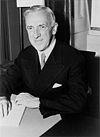 John Gerald Milton John Gerald MiltonJohn Gerald Milton John Gerald Milton was a Democratic United States Senator from New Jersey.Born in Jersey City, New Jersey; attended the public schools; studied law; admitted to the bar in 1903 and commenced practice in Jersey City, N.J.; appointed on January 18, 1938, as a Democrat to the United States Senate, to... |
Democratic Democratic Party (United States) The Democratic Party is one of two major contemporary political parties in the United States, along with the Republican Party. The party's socially liberal and progressive platform is largely considered center-left in the U.S. political spectrum. The party has the lengthiest record of continuous... |
January 18, 1938 – November 8, 1938 |
Appointed to continue Moore's term Retired when successor elected |
||
| 33 | 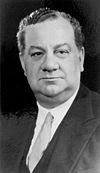 William Warren Barbour William Warren BarbourWilliam Warren Barbour William Warren Barbour was an American Republican Party politician who represented New Jersey in the United States Senate from 1931 to 1937 and again from 1938 until his death in office in 1943... |
Republican Republican Party (United States) The Republican Party is one of the two major contemporary political parties in the United States, along with the Democratic Party. Founded by anti-slavery expansion activists in 1854, it is often called the GOP . The party's platform generally reflects American conservatism in the U.S... |
November 8, 1938 – November 22, 1943 |
75 75th United States Congress The Seventy-fifth United States Congress was a meeting of the legislative branch of the United States federal government, composed of the United States Senate and the United States House of Representatives. It met in Washington, DC from January 3, 1937 to January 3, 1939, during the first two years... (Continued) |
Elected to finish Moore's term | |
| 76 76th United States Congress The Seventy-sixth United States Congress was a meeting of the legislative branch of the United States federal government, composed of the United States Senate and the United States House of Representatives. It met in Washington, DC from January 3, 1939 to January 3, 1941, during the seventh and... |
||||||
| 77 77th United States Congress -Major events:* December 7, 1941: Attack on Pearl Harbor* December 8, 1941: Joint Session of Congress met to hear President Roosevelt deliver his "Day of Infamy" speech... |
27 | Re-elected in 1940 Died |
||||
| 78 78th United States Congress The Seventy-eighth United States Congress was a meeting of the legislative branch of the United States federal government, composed of the United States Senate and the United States House of Representatives. It met in Washington, DC from January 3, 1943 to January 3, 1945, during the last two years... |
||||||
| Vacant | November 22, 1943 – November 26, 1943 |
|||||
| 34 | 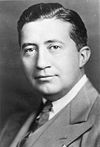 Arthur Walsh Arthur Walsh |
Democratic Democratic Party (United States) The Democratic Party is one of two major contemporary political parties in the United States, along with the Republican Party. The party's socially liberal and progressive platform is largely considered center-left in the U.S. political spectrum. The party has the lengthiest record of continuous... |
November 26, 1943 – December 7, 1944 |
Appointed to finish Barbour's term Retired when successor was elected |
||
| 35 |  Howard Alexander Smith Howard Alexander Smith |
Republican Republican Party (United States) The Republican Party is one of the two major contemporary political parties in the United States, along with the Democratic Party. Founded by anti-slavery expansion activists in 1854, it is often called the GOP . The party's platform generally reflects American conservatism in the U.S... |
December 7, 1944– January 3, 1959 |
78 78th United States Congress The Seventy-eighth United States Congress was a meeting of the legislative branch of the United States federal government, composed of the United States Senate and the United States House of Representatives. It met in Washington, DC from January 3, 1943 to January 3, 1945, during the last two years... (Continued) |
Elected to finish Barbour's term | |
| 79 79th United States Congress The Seventy-ninth United States Congress was a meeting of the legislative branch of the United States federal government, composed of the United States Senate and the United States House of Representatives. It met in Washington, DC from January 3, 1945 to January 3, 1947, during the last months of... |
||||||
| 80 80th United States Congress The Eightieth United States Congress was a meeting of the legislative branch of the United States federal government, composed of the United States Senate and the United States House of Representatives. It met in Washington, DC from January 3, 1947 to January 3, 1949, during the third and fourth... |
28 | Re-elected in 1946 | ||||
| 81 81st United States Congress The Eighty-first United States Congress was a meeting of the legislative branch of the United States federal government, composed of the United States Senate and the United States House of Representatives... |
||||||
| 82 82nd United States Congress The Eighty-second United States Congress was a meeting of the legislative branch of the United States federal government, composed of the United States Senate and the United States House of Representatives. It met in Washington, DC from January 3, 1951 to January 3, 1953, during the last two years... |
||||||
| 83 83rd United States Congress The Eighty-third United States Congress was a meeting of the legislative branch of the United States federal government, composed of the United States Senate and the United States House of Representatives. It met in Washington, DC from January 3, 1953 to January 3, 1955, during the first two years... |
29 | Re-elected in 1952 Retired |
||||
| 84 84th United States Congress The Eighty-fourth United States Congress was a meeting of the legislative branch of the United States federal government, composed of the United States Senate and the United States House of Representatives. It met in Washington, DC from January 3, 1955 to January 3, 1957, during the third and... |
||||||
| 85 85th United States Congress The Eighty-fifth United States Congress was a meeting of the legislative branch of the United States federal government, composed of the United States Senate and the United States House of Representatives. It met in Washington, DC from January 3, 1957 to January 3, 1959, during the fifth and sixth... |
||||||
| 36 | .jpg) Harrison A. Williams Harrison A. WilliamsHarrison A. Williams Harrison Arlington "Pete" Williams, Jr. was a Democrat who represented New Jersey in both the United States House of Representatives and the United States Senate . Williams was convicted on May 1, 1981 for taking bribes in the Abscam sting operation, and resigned from the U.S. Senate in 1982... |
Democratic Democratic Party (United States) The Democratic Party is one of two major contemporary political parties in the United States, along with the Republican Party. The party's socially liberal and progressive platform is largely considered center-left in the U.S. political spectrum. The party has the lengthiest record of continuous... |
January 3, 1959– March 11, 1982 |
86 86th United States Congress The Eighty-sixth United States Congress was a meeting of the legislative branch of the United States federal government, composed of the United States Senate and the United States House of Representatives. It met in Washington, DC from January 3, 1959 to January 3, 1961, during the last two years... |
30 | Elected in 1958 |
| 87 87th United States Congress -House of Representatives :-Senate:* President: Richard Nixon , until January 20, 1961** Lyndon Johnson , from January 20, 1961* President pro tempore: Carl Hayden -House of Representatives:... |
||||||
| 88 88th United States Congress The Eighty-eighth United States Congress was a meeting of the legislative branch of the United States federal government, composed of the United States Senate and the United States House of Representatives. It met in Washington, DC from January 3, 1963 to January 3, 1965, during the last year of... |
||||||
| 89 89th United States Congress -House of Representatives:- Senate :* President of the Senate: Hubert Humphrey , starting January 20, 1965* President pro tempore: Carl Hayden - Majority leadership :* Majority Leader and Democratic Conference Chairman: Mike Mansfield... |
31 | Re-elected in 1964 | ||||
| 90 90th United States Congress The Ninetieth United States Congress was a meeting of the legislative branch of the United States federal government, composed of the United States Senate and the United States House of Representatives. It met in Washington, DC from January 3, 1967 to January 3, 1969, during the last two years of... |
||||||
| 91 91st United States Congress The Ninety-first United States Congress was a meeting of the legislative branch of the United States federal government, composed of the United States Senate and the United States House of Representatives. It met in Washington, DC from January 3, 1969 to January 3, 1971, during the first two years... |
||||||
| 92 92nd United States Congress The Ninety-second United States Congress was a meeting of the legislative branch of the United States federal government, composed of the United States Senate and the United States House of Representatives... |
32 | Re-elected in 1970 | ||||
| 93 93rd United States Congress The Ninety-third United States Congress was a meeting of the legislative branch of the United States federal government, composed of the United States Senate and the United States House of Representatives. It met in Washington, DC from January 3, 1973 to January 3, 1975, during the end of Richard... |
||||||
| 94 94th United States Congress The Ninety-fourth United States Congress was a meeting of the legislative branch of the United States federal government, composed of the United States Senate and the United States House of Representatives. It met in Washington, DC from January 3, 1975 to January 3, 1977, during the administration... |
||||||
| 95 95th United States Congress The Ninety-fifth United States Congress was a meeting of the legislative branch of the United States federal government, composed of the United States Senate and the United States House of Representatives. It met in Washington, DC from January 3, 1977 to January 3, 1979, during the first two years... |
33 | Re-elected in 1976 Resigned |
||||
| 96 96th United States Congress The Ninety-sixth United States Congress was a meeting of the legislative branch of the United States federal government, composed of the United States Senate and the United States House of Representatives. It met in Washington, DC from January 3, 1979 to January 3, 1981, during the last two years... |
||||||
| 97 97th United States Congress The Ninety-seventh United States Congress was a meeting of the legislative branch of the United States federal government, composed of the United States Senate and the United States House of Representatives. It met in Washington, DC from January 3, 1981 to January 3, 1983, during the final weeks of... |
||||||
| Vacant | March 11, 1982 – April 12, 1982 |
|||||
| 37 |  Nicholas F. Brady Nicholas F. BradyNicholas F. Brady Nicholas Frederick Brady was United States Secretary of the Treasury under Presidents Ronald Reagan and George H. W. Bush, and is also known for articulating the Brady Plan in March 1989.-Early life:... |
Republican Republican Party (United States) The Republican Party is one of the two major contemporary political parties in the United States, along with the Democratic Party. Founded by anti-slavery expansion activists in 1854, it is often called the GOP . The party's platform generally reflects American conservatism in the U.S... |
April 12, 1982 – December 20, 1982 |
Appointed to finish Williams's term Resigned early to give elected successor preferential seniority |
||
| Vacant | December 20, 1982 – December 27, 1982 |
|||||
| 38 | Frank Lautenberg Frank Lautenberg Frank Raleigh Lautenberg is the senior United States Senator from New Jersey and a member of the Democratic Party. Previously, he was the Chairman and Chief Executive Officer of Automatic Data Processing, Inc.-Early life, career, and family:... |
Democratic Democratic Party (United States) The Democratic Party is one of two major contemporary political parties in the United States, along with the Republican Party. The party's socially liberal and progressive platform is largely considered center-left in the U.S. political spectrum. The party has the lengthiest record of continuous... |
December 27, 1982 – January 3, 2001 |
97 97th United States Congress The Ninety-seventh United States Congress was a meeting of the legislative branch of the United States federal government, composed of the United States Senate and the United States House of Representatives. It met in Washington, DC from January 3, 1981 to January 3, 1983, during the final weeks of... (Continued) |
Appointed early, having been already elected to the next term | |
| 98 98th United States Congress The Ninety-eighth United States Congress was a meeting of the legislative branch of the United States federal government, composed of the United States Senate and the United States House of Representatives. It met in Washington, DC from January 3, 1983 to January 3, 1985, during the third and... |
34 | Elected in 1982 | ||||
| 99 99th United States Congress The Ninety-ninth United States Congress was a meeting of the legislative branch of the United States federal government, composed of the United States Senate and the United States House of Representatives. It met in Washington, DC from January 3, 1985 to January 3, 1987, during the fifth and sixth... |
||||||
| 100 100th United States Congress -House of Representatives:- Senate :* President: George H.W. Bush * President pro tempore: John Stennis - Majority leadership :* Majority Leader, Democratic Conference Chairman, and Democratic Policy Committee Chairman: Robert Byrd... |
||||||
| 101 101st United States Congress The One Hundred First United States Congress was a meeting of the legislative branch of the United States federal government, composed of the United States Senate and the United States House of Representatives. It met in Washington, DC from January 3, 1989 to January 3, 1991, during the first two... |
35 | Re-elected in 1988 United States Senate election in New Jersey, 1988 The 1988 United States Senate election in New Jersey was held on November 8, 1988. Incumbent Democratic U.S. Senator Frank Lautenberg won re-election to a second term.- Republican :... |
||||
| 102 102nd United States Congress -House of Representatives:- Senate :* President:Dan Quayle * President pro tempore: Robert Byrd - Majority leadership :* Majority Leader: George Mitchell* Majority Whip: Wendell Ford- Minority leadership :... |
||||||
| 103 103rd United States Congress - House of Representatives :- Leadership :- Senate :* President: Dan Quayle , until January 20, 1993** Al Gore , from January 20, 1993* President pro tempore: Robert Byrd - Majority leadership :* Majority Leader: George Mitchell... |
||||||
| 104 104th United States Congress The One Hundred Fourth United States Congress was a meeting of the legislative branch of the United States federal government, composed of the United States Senate and the United States House of Representatives. It met in Washington, DC from January 3, 1995 to January 3, 1997, during the third and... |
36 | Re-elected in 1994 United States Senate election in New Jersey, 1994 The 1994 United States Senate Election in New Jersey was held on November 8, 1994. Incumbent Democratic U.S. Senator Frank Lautenberg won re-election to a third term.-Results:... Retired |
||||
| 105 105th United States Congress The One Hundred Fifth United States Congress was a meeting of the legislative branch of the United States federal government, composed of the United States Senate and the United States House of Representatives. It met in Washington, DC from January 3, 1997 to January 3, 1999, during the fifth and... |
||||||
| 106 106th United States Congress The One Hundred Sixth United States Congress was a meeting of the legislative branch of the United States federal government, composed of the United States Senate and the United States House of Representatives. It met in Washington, DC from January 3, 1999 to January 3, 2001, during the last two... |
||||||
| 39 | 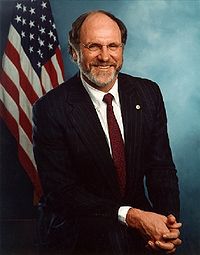 Jon S. Corzine Jon S. Corzine |
Democratic Democratic Party (United States) The Democratic Party is one of two major contemporary political parties in the United States, along with the Republican Party. The party's socially liberal and progressive platform is largely considered center-left in the U.S. political spectrum. The party has the lengthiest record of continuous... |
January 3, 2001 – January 17, 2006 |
107 107th United States Congress The One Hundred Seventh United States Congress was a meeting of the legislative branch of the United States federal government, composed of the United States Senate and the United States House of Representatives. It met in Washington, D.C. from January 3, 2001 to January 3, 2003, during the final... |
37 | Elected in 2000 United States Senate election in New Jersey, 2000 The 2000 United States Senate election in New Jersey was held on November 7, 2000. Incumbent Democratic U.S. Senator Frank Lautenberg decided to retire, instead of seeking a fourth term. Democrat nominee, former CEO of Goldman Sachs Jon Corzine defeated Republican nominee, U.S. Congressman Bob... Resigned to become N.J. Governor Governor of New Jersey The Office of the Governor of New Jersey is the executive branch for the U.S. state of New Jersey. The office of Governor is an elected position, for which elected officials serve four year terms. While individual politicians may serve as many terms as they can be elected to, Governors cannot be... |
| 108 108th United States Congress The One Hundred Eighth United States Congress was the legislative branch of the United States federal government, composed of the United States Senate and the United States House of Representatives from January 3, 2003 to January 3, 2005, during the third and fourth years of George W. Bush's... |
||||||
| 109 109th United States Congress The One Hundred Ninth United States Congress was the legislative branch of the United States, composed of the United States Senate and the United States House of Representatives, from January 3, 2005 to January 3, 2007, during the fifth and sixth years of George W. Bush's presidency. House members... |
||||||
| 40 |  Bob Menendez Bob Menendez |
Democratic Democratic Party (United States) The Democratic Party is one of two major contemporary political parties in the United States, along with the Republican Party. The party's socially liberal and progressive platform is largely considered center-left in the U.S. political spectrum. The party has the lengthiest record of continuous... |
January 18, 2006 – Present |
109 109th United States Congress The One Hundred Ninth United States Congress was the legislative branch of the United States, composed of the United States Senate and the United States House of Representatives, from January 3, 2005 to January 3, 2007, during the fifth and sixth years of George W. Bush's presidency. House members... (Continued) |
Appointed to finish Corzine's term | |
| 110 110th United States Congress The One Hundred Tenth United States Congress was the meeting of the legislative branch of the United States federal government, between January 3, 2007, and January 3, 2009, during the last two years of the second term of President George W. Bush. It was composed of the Senate and the House of... |
38 | Elected to full term in 2006 | ||||
| 111 111th United States Congress The One Hundred Eleventh United States Congress was the meeting of the legislative branch of the United States federal government from January 3, 2009 until January 3, 2011. It began during the last two weeks of the George W. Bush administration, with the remainder spanning the first two years of... |
||||||
| 112 112th United States Congress The One Hundred Twelfth United States Congress is the current meeting of the legislative branch of the United States federal government, composed of the United States Senate and the United States House of Representatives. It convened in Washington, D.C. on January 3, 2011, and will end on January... |
||||||
| # | Senator | Party | Years | Congress | Term | Electoral history |
Class 2
Class 2 senatorsClasses of United States Senators
The three classes of United States Senators are currently made up of 33 or 34 Senate seats. The purpose of the classes is to determine which Senate seats will be up for election in a given year. The three groups are staggered so that one of them is up for election every two years.A senator's...
belong to the electoral cycle that were elected for two sessions of the U.S. Congress in the first election of 1788 and whose seats in recent years are contested in 1996
United States Senate election in New Jersey, 1996
The 1996 United States Senate election in New Jersey was held on November 6, 1996. Incumbent Democratic U.S. Senator Bill Bradley decided to retire instead of seeking a fourth term.-Candidates:*Dick Zimmer, U.S...
, 2002
United States Senate election in New Jersey, 2002
The 2000 United States Senate election in New Jersey was held on November 5, 2002. Incumbent Democratic U.S. Senator Robert Torricelli decided to retire. Democrat Frank Lautenberg won the open seat.- Campaign :...
, 2008
United States Senate election in New Jersey, 2008
The 2008 United States Senate election in NJ was held on November 4, 2008. Incumbent Democratic U.S. Senator Frank Lautenberg won re-election to a fourth, non-consecutive term.-Background:...
, and 2014
United States Senate elections, 2014
Elections for the United States Senate will be held on November 4, 2014, with 33 of the 100 seats in the Senate being contested in regular elections whose winners will serve six-year terms from January 3, 2015 until January 3, 2021. Additionally, special elections may be held to fill vacancies that...
.
| # | Senator | Party | Years | Congress | Term | Electoral history |
|---|---|---|---|---|---|---|
| 1 | 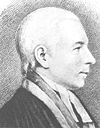 William Paterson William Paterson |
Pro- Administration Pro-Administration Party (United States) Pro-Administration "Party" is a term by historians to describe the supporters of the policies of George Washington's administration — especially Treasury Secretary Alexander Hamilton's financial policies — prior to the formation of the Federalist and Democratic-Republican Parties.Almost the entire... |
March 4, 1789 – November 13, 1790 |
1 1st United States Congress -House of Representatives:During this congress, five House seats were added for North Carolina and one House seat was added for Rhode Island when they ratified the Constitution.-Senate:* President: John Adams * President pro tempore: John Langdon... |
1 | Elected in 1789 Resigned to become N.J. Governor Governor of New Jersey The Office of the Governor of New Jersey is the executive branch for the U.S. state of New Jersey. The office of Governor is an elected position, for which elected officials serve four year terms. While individual politicians may serve as many terms as they can be elected to, Governors cannot be... |
| Vacant | ||||||
| 2 | 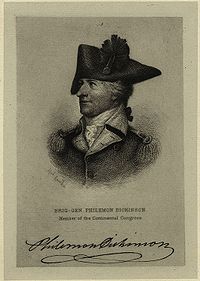 Philemon Dickinson Philemon DickinsonPhilemon Dickinson Philemon Dickinson was an American lawyer and politician from Trenton, New Jersey. As a brigadier general of the New Jersey militia, he was one of the most effective militia officers of the American Revolutionary War. He was also a Continental Congressman from Delaware and a United States Senator... |
Pro- Administration Pro-Administration Party (United States) Pro-Administration "Party" is a term by historians to describe the supporters of the policies of George Washington's administration — especially Treasury Secretary Alexander Hamilton's financial policies — prior to the formation of the Federalist and Democratic-Republican Parties.Almost the entire... |
November 23, 1790– March 3, 1793 |
1 1st United States Congress -House of Representatives:During this congress, five House seats were added for North Carolina and one House seat was added for Rhode Island when they ratified the Constitution.-Senate:* President: John Adams * President pro tempore: John Langdon... (continued) |
Elected to finish Paterson's term Retired |
|
| 2 2nd United States Congress -House of Representatives:During this congress, two new House seats were added for each of the new states of Vermont and Kentucky. -Leadership:-Senate:*President: John Adams *President pro tempore:** Richard Henry Lee... |
||||||
| 3 | 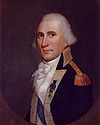 Frederick Frelinghuysen Frederick Frelinghuysen |
Federalist Federalist Party (United States) The Federalist Party was the first American political party, from the early 1790s to 1816, the era of the First Party System, with remnants lasting into the 1820s. The Federalists controlled the federal government until 1801... |
March 4, 1793– November 12, 1796 |
3 3rd United States Congress The Third United States Congress was a meeting of the legislative branch of the United States federal government, consisting of the United States Senate and the United States House of Representatives... |
2 | Elected in 1793 Resigned |
| 4 4th United States Congress -House of Representatives:- Senate :* President: John Adams * President pro tempore:** Henry Tazewell , first elected December 7, 1795** Samuel Livermore , first elected May 6, 1796** William Bingham , first elected February 16, 1797... |
||||||
| 4 |  Robert F. Stockton Robert F. Stockton |
Federalist Federalist Party (United States) The Federalist Party was the first American political party, from the early 1790s to 1816, the era of the First Party System, with remnants lasting into the 1820s. The Federalists controlled the federal government until 1801... |
November 12, 1796– March 3, 1799 |
Elected to finish Frelinghuysen's term Retired |
||
| 5 5th United States Congress The Fifth United States Congress was a meeting of the legislative branch of the United States federal government, consisting of the United States Senate and the United States House of Representatives... |
||||||
| 5 | 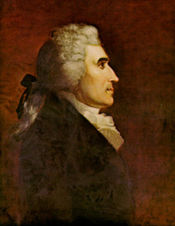 Jonathan Dayton Jonathan DaytonJonathan Dayton Jonathan Dayton was an American politician from the U.S. state of New Jersey. He was the youngest person to sign the United States Constitution and a member of the U.S. House of Representatives, serving as the fourth Speaker of the United States House of Representatives, and later the U.S. Senate... |
Federalist Federalist Party (United States) The Federalist Party was the first American political party, from the early 1790s to 1816, the era of the First Party System, with remnants lasting into the 1820s. The Federalists controlled the federal government until 1801... |
March 4, 1799– March 3, 1805 |
6 6th United States Congress The Sixth United States Congress was a meeting of the legislative branch of the United States federal government, consisting of the United States Senate and the United States House of Representatives. It met at Congress Hall in Philadelphia, Pennsylvania and in Washington, D.C. from March 4, 1799... |
3 | Elected in 1799 |
| 7 7th United States Congress - House of Representatives :-Senate:* President: Aaron Burr * President pro tempore:** Abraham Baldwin , first elected December 7, 1801** Stephen R. Bradley , first elected December 14, 1802-House of Representatives:... |
||||||
| 8 8th United States Congress - Senate :* President: Aaron Burr * President pro tempore: John Brown , October 17, 1803 – February 26, 1804** Jesse Franklin , March 10, 1804 – November 4, 1804** Joseph Anderson , January 15, 1805 – December 1, 1805- House of Representatives :... |
||||||
| 6 |  Aaron Kitchell Aaron KitchellAaron Kitchell Aaron Kitchell was a blacksmith and politician from Hanover Township, New Jersey. He represented New Jersey in both the United States House of Representatives and the Senate.... |
Democratic- Republican Democratic-Republican Party (United States) The Democratic-Republican Party or Republican Party was an American political party founded in the early 1790s by Thomas Jefferson and James Madison. Political scientists use the former name, while historians prefer the latter one; contemporaries generally called the party the "Republicans", along... |
March 4, 1805 – March 12, 1809 |
9 9th United States Congress - Senate :* President: George Clinton * President pro tempore: Samuel Smith - House of Representatives :* Speaker: Nathaniel Macon -Members:This list is arranged by chamber, then by state... |
4 | Elected in 1805 Resigned |
| 10 10th United States Congress - House of Representatives :- Senate :*President: George Clinton *President pro tempore: Samuel Smith , elected April 16, 1808** Stephen R. Bradley , elected December 28, 1808** John Milledge , elected January 30, 1809... |
||||||
| 11 11th United States Congress - House of Representatives :-Leadership:- Senate :* President: George Clinton * President pro tempore:** John Milledge ** Andrew Gregg , elected June 26, 1809** John Gaillard , elected February 28, 1810... |
||||||
| Vacant | March 12, 1809 – March 21, 1809 |
11 11th United States Congress - House of Representatives :-Leadership:- Senate :* President: George Clinton * President pro tempore:** John Milledge ** Andrew Gregg , elected June 26, 1809** John Gaillard , elected February 28, 1810... (continued) |
||||
| 7 |  John Condit John ConditJohn Condit John Condit was a United States Representative and a United States Senator from New Jersey and father of United States Representative Silas Condit.... |
Democratic- Republican Democratic-Republican Party (United States) The Democratic-Republican Party or Republican Party was an American political party founded in the early 1790s by Thomas Jefferson and James Madison. Political scientists use the former name, while historians prefer the latter one; contemporaries generally called the party the "Republicans", along... |
March 21, 1809 – March 3, 1817 |
11 11th United States Congress - House of Representatives :-Leadership:- Senate :* President: George Clinton * President pro tempore:** John Milledge ** Andrew Gregg , elected June 26, 1809** John Gaillard , elected February 28, 1810... (continued) |
Elected to finish the term. | |
| 12 12th United States Congress - House of Representatives :During this congress, one new House seat was added for the new state of Louisiana.- Senate :*President: George Clinton *President pro tempore: William H. Crawford -House of Representatives:*Speaker: Henry Clay... |
5 | Re-elected to a full term in November, 1810. |
||||
| 13 13th United States Congress - Senate :* President: Elbridge Gerry , until November 23, 1814, thereafter vacant.* President pro tempore: Joseph B. Varnum , December 6, 1813 – February 3, 1814** John Gaillard , elected November 25, 1814- House of Representatives :... |
||||||
| 14 14th United States Congress - Senate :* President: Vacant* President pro tempore: John Gaillard of South Carolina, first elected December 4, 1815- House of Representatives :* Speaker: Henry Clay of Kentucky-Members:This list is arranged by chamber, then by state... |
||||||
| 8 |  Mahlon Dickerson Mahlon DickersonMahlon Dickerson Mahlon Dickerson was an American judge and politician. He was elected Governor of New Jersey as well as United States Senator from that state. He was twice appointed Secretary of the Navy - under Presidents Andrew Jackson and Martin van Buren... |
Democratic- Republican Democratic-Republican Party (United States) The Democratic-Republican Party or Republican Party was an American political party founded in the early 1790s by Thomas Jefferson and James Madison. Political scientists use the former name, while historians prefer the latter one; contemporaries generally called the party the "Republicans", along... |
March 4, 1817 – January 30, 1829 |
15 15th United States Congress -Leadership:- Senate :* President: Daniel D. Tompkins * President pro tempore:** John Gaillard , elected March 4, 1817** James Barbour , elected February 15, 1819- House of Representatives :*Speaker: Henry Clay -Members:... |
6 | Elected in 1817 |
| 16 16th United States Congress -House of Representatives:During this congress, one House seat was added for the new state of Alabama and one seat was reapportioned from Massachusetts to the new state of Maine. For the beginning of the next congress, six more seats from Massachusetts would be reapportioned to... |
||||||
| 17 17th United States Congress The Seventeenth United States Congress was a meeting of the legislative branch of the United States federal government, consisting of the United States Senate and the United States House of Representatives. It met in Washington, D.C. from March 4, 1821 to March 3, 1823, during the fifth and sixth... |
||||||
| Crawford Republican Democratic-Republican Party (United States) The Democratic-Republican Party or Republican Party was an American political party founded in the early 1790s by Thomas Jefferson and James Madison. Political scientists use the former name, while historians prefer the latter one; contemporaries generally called the party the "Republicans", along... |
18 18th United States Congress The Eighteenth United States Congress was a meeting of the legislative branch of the United States federal government, consisting of the United States Senate and the United States House of Representatives. It met in Washington, D.C. from March 4, 1823 to March 3, 1825, during the seventh and eighth... |
7 | Re-elected in 1823 Resigned and immediately re-elected for the Class 1 seat |
|||
| Jacksonian | 19 19th United States Congress -House of Representatives:-Leadership:- Senate :* President: John C. Calhoun * President pro tempore: John Gaillard , until December 4, 1825** Nathaniel Macon , from May 20, 1826- House of Representatives :* Speaker: John W. Taylor -Members:... |
|||||
| 20 20th United States Congress -House of Representatives:-Leadership:- Senate :* President: John C. Calhoun * President pro tempore: Samuel Smith - House of Representatives :* Speaker: Andrew Stevenson -Members:This list is arranged by chamber, then by state... |
||||||
| Vacant | January 30, 1829 – March 4, 1829 |
20 20th United States Congress -House of Representatives:-Leadership:- Senate :* President: John C. Calhoun * President pro tempore: Samuel Smith - House of Representatives :* Speaker: Andrew Stevenson -Members:This list is arranged by chamber, then by state... (continued) |
||||
| 9 | 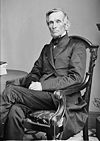 Theodore Frelinghuysen Theodore FrelinghuysenTheodore Frelinghuysen Theodore Frelinghuysen was an American politician, serving as New Jersey Attorney General, United States Senator, and Mayor of Newark, New Jersey before running as a candidate for Vice President with Henry Clay on the Whig ticket in the election of 1844... |
Anti- Jacksonian |
March 4, 1829 – March 3, 1835 |
21 21st United States Congress -House of Representatives:-Leadership:- Senate :* President: John C. Calhoun * President pro tempore: Samuel Smith - House of Representatives :* Speaker: Andrew Stevenson -Members:This list is arranged by chamber, then by state... |
8 | Elected in 1828 United States Senate elections, 1828 The United States Senate election of 1828 was an election which had the Jacksonian coalition, despite its leader's victory in the presidential election, lose two seats in the United States Senate to the opposing Anti-Jackson coalition.... |
| 22 22nd United States Congress -House of Representatives:-Leadership:- Senate :* President:** John C. Calhoun , resigned December 28, 1832, thereafter vacant.* President pro tempore:** Samuel Smith , first elected December 5, 1831** Littleton W... |
||||||
| 23 23rd United States Congress -House of Representatives:For the beginning of this congress, the size of the House was increased from 213 seats to 240 seats, following the 1830 United States Census .- Leadership :- Senate :* President: Martin Van Buren... |
||||||
| 10 | 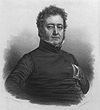 Garret D. Wall Garret D. WallGarret D. Wall Garret Dorset Wall was a military officer and politician from New Jersey.-Biography:Born in Middletown Township, he completed preparatory studies, studied law, was licensed as an attorney in 1804 and as a counselor in 1807, and commenced practice in Burlington, New Jersey. He served in the War of... |
Jacksonian | March 4, 1835 – March 3, 1841 |
24 24th United States Congress -House of Representatives:During this congress one House seat was added for each of the new states of Arkansas and Michigan.-Leadership:- Senate :* President: Martin Van Buren * President pro tempore: William R. King - House of Representatives :... |
9 | Elected in 1835 Lost re-election |
| Democratic Democratic Party (United States) The Democratic Party is one of two major contemporary political parties in the United States, along with the Republican Party. The party's socially liberal and progressive platform is largely considered center-left in the U.S. political spectrum. The party has the lengthiest record of continuous... |
25 25th United States Congress -House of Representatives:-Leadership:- Senate :* President: Richard Mentor Johnson * President pro tempore: William R. King - House of Representatives :* Speaker: James K. Polk -Members:This list is arranged by chamber, then by state... |
|||||
| 26 26th United States Congress -House of Representatives:- Leadership :- Senate :*President: Richard M. Johnson *President pro tempore: William R. King - House of Representatives :*Speaker: Robert M.T. Hunter -Members:This list is arranged by chamber, then by state... |
||||||
| 11 | 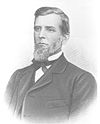 Jacob W. Miller Jacob W. MillerJacob W. Miller Jacob Welsh Miller was a United States Senator from New Jersey.-Biography:Born in German Valley, New Jersey , he attended the public schools, studied law, was admitted to the bar in 1823, and practiced in Morristown... |
Whig Whig Party (United States) The Whig Party was a political party of the United States during the era of Jacksonian democracy. Considered integral to the Second Party System and operating from the early 1830s to the mid-1850s, the party was formed in opposition to the policies of President Andrew Jackson and his Democratic... |
March 4, 1841 – March 3, 1853 |
27 27th United States Congress The Twenty-seventh United States Congress was a meeting of the legislative branch of the United States federal government, consisting of the United States Senate and the United States House of Representatives. It met in Washington, D.C. from March 4, 1841 to March 3, 1843, during the one-month... |
10 | Elected in 1840 United States Senate elections, 1840 The United States Senate election of 1840 was an election which, corresponding with their Party's success in the 1840 Presidential election, had the Whig Party take control of the United States Senate.... |
| 28 28th United States Congress -House of Representatives:Following the 1840 United States Census, Congress reapportioned the House to include 223 seats . During this congress, one House seat was added for the new state of Florida .- Senate :*President: Vacant... |
||||||
| 29 29th United States Congress -House of Representatives:During this congress, two House seats were added for each of the new states of Texas and Iowa.-Leadership:-Senate:* President: George M. Dallas * President pro tempore: Willie P. Mangum... |
||||||
| 30 30th United States Congress The Thirtieth United States Congress was a meeting of the legislative branch of the United States federal government, consisting of the United States Senate and the United States House of Representatives. It met in Washington, D.C. from March 4, 1847 to March 3, 1849, during the last two years of... |
11 | Re-elected in 1846 United States Senate elections, 1846 The United States Senate election of 1846 was an election which had the Democratic Party gain four seats in the United States Senate.As this election was prior to ratification of the seventeenth amendment, Senators were chosen by State legislatures.-Results:... |
||||
| 31 31st United States Congress The Thirty-first United States Congress was a meeting of the legislative branch of the United States federal government, consisting of the United States Senate and the United States House of Representatives. It met in Washington, D.C. from March 4, 1849 to March 3, 1851, during the last 17 months... |
||||||
| 32 32nd United States Congress The Thirty-second United States Congress was a meeting of the legislative branch of the United States federal government, consisting of the United States Senate and the United States House of Representatives. It met in Washington, D.C. from March 4, 1851 to March 3, 1853, during the third and... |
||||||
| 12 |  William Wright William Wright |
Democratic Democratic Party (United States) The Democratic Party is one of two major contemporary political parties in the United States, along with the Republican Party. The party's socially liberal and progressive platform is largely considered center-left in the U.S. political spectrum. The party has the lengthiest record of continuous... |
March 4, 1853 – March 3, 1859 |
33 33rd United States Congress The Thirty-third United States Congress was a meeting of the legislative branch of the United States federal government, consisting of the United States Senate and the United States House of Representatives. It met in Washington, D.C. from March 4, 1853 to March 3, 1855, during the first two years... |
12 | Elected in 1852 United States Senate elections, 1852 The United States Senate election of 1852 was an election which had the Democratic Party gain two seats in the United States Senate, and which coincided with the 1852 Presidential election.... Lost re-election |
| 34 34th United States Congress The Thirty-fourth United States Congress was a meeting of the legislative branch of the United States federal government, consisting of the United States Senate and the United States House of Representatives. It met in Washington, D.C. from March 4, 1855 to March 4, 1857, during the last two years... |
||||||
| 35 35th United States Congress The 35th United States Congress was a meeting of the legislative branch of the United States federal government, consisting of the United States Senate and the United States House of Representatives. It met in Washington, D.C. from March 4, 1857 to March 3, 1859, during the first two years of James... |
||||||
| 13 | 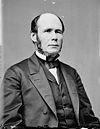 John C. Ten Eyck John C. Ten EyckJohn C. Ten Eyck John Conover Ten Eyck was a United States Senator from New Jersey during the American Civil War.Born in Freehold, New Jersey, he completed preparatory studies under private tutors, studied law, was admitted to the bar in 1835, and commenced practice in Burlington, New Jersey... |
Republican Republican Party (United States) The Republican Party is one of the two major contemporary political parties in the United States, along with the Democratic Party. Founded by anti-slavery expansion activists in 1854, it is often called the GOP . The party's platform generally reflects American conservatism in the U.S... |
March 4, 1859 – March 3, 1865 |
36 36th United States Congress The Thirty-sixth United States Congress was a meeting of the legislative branch of the United States federal government, consisting of the United States Senate and the United States House of Representatives. It met in Washington, D.C. from March 4, 1859 to March 4, 1861, during the third and fourth... |
13 | Elected in 1858 United States Senate elections, 1858 The United States Senate election of 1858 was an election which had the Republican Party gain six additional seats in the United States Senate.As this election was prior to ratification of the seventeenth amendment, Senators were chosen by State legislatures.... Lost re-election |
| 37 37th United States Congress The Thirty-seventh United States Congress was a meeting of the legislative branch of the United States federal government, consisting of the United States Senate and the United States House of Representatives. It met in Washington, D.C. from March 4, 1861 to March 4, 1863, during the first two... |
||||||
| 38 38th United States Congress -House of Representatives:Before this Congress, the 1860 United States Census and resulting reapportionment changed the size of the House to 241 members... |
||||||
| Vacant | March 3, 1865– March 15, 1865 |
39 39th United States Congress The Thirty-ninth United States Congress was a meeting of the legislative branch of the United States federal government, consisting of the United States Senate and the United States House of Representatives. It met in Washington, D.C. from March 4, 1865 to March 4, 1867, during the first month of... |
14 | |||
| 14 |  John P. Stockton John P. StocktonJohn P. Stockton John Potter Stockton was a New Jersey politician who served in the United States Senate as a Democrat.Born in Princeton, New Jersey, Stockton was the son of Robert F. Stockton, grandson of Richard Stockton and the great-grandson of Richard Stockton , both prominent New Jersey politicians... |
Democratic Democratic Party (United States) The Democratic Party is one of two major contemporary political parties in the United States, along with the Republican Party. The party's socially liberal and progressive platform is largely considered center-left in the U.S. political spectrum. The party has the lengthiest record of continuous... |
March 15, 1865 – March 27, 1866 |
Elected in 1864 United States Senate elections, 1864 The United States Senate election of 1864 was an election corresponding with Abraham Lincoln's re-election, with the Republican Party gaining six seats in the United States Senate... Election disputed and seat declared vacant |
||
| Vacant | ||||||
| 15 | 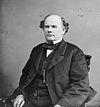 Alexander G. Cattell Alexander G. CattellAlexander G. Cattell Alexander Gilmore Cattell was a United States Senator from New Jersey. Born in Salem, New Jersey, he received an academic education, and engaged in mercantile pursuits in Salem until 1846. He was elected to the New Jersey General Assembly in 1840, and served as clerk from 1842-1844... |
Republican Republican Party (United States) The Republican Party is one of the two major contemporary political parties in the United States, along with the Democratic Party. Founded by anti-slavery expansion activists in 1854, it is often called the GOP . The party's platform generally reflects American conservatism in the U.S... |
September 19, 1866 – March 3, 1871 |
39 39th United States Congress The Thirty-ninth United States Congress was a meeting of the legislative branch of the United States federal government, consisting of the United States Senate and the United States House of Representatives. It met in Washington, D.C. from March 4, 1865 to March 4, 1867, during the first month of... (continued) |
Elected to finish Stockton's term Retired |
|
| 40 40th United States Congress The Fortieth United States Congress was a meeting of the legislative branch of the United States federal government, consisting of the United States Senate and the United States House of Representatives. It met in Washington, D.C. from March 4, 1867 to March 4, 1869, during the third and fourth... |
||||||
| 41 41st United States Congress -House of Representatives:- Senate :* President : Schuyler Colfax* President pro tempore: Henry B. Anthony - House of Representatives :* Speaker: James G. Blaine -Members:This list is arranged by chamber, then by state... |
||||||
| 16 |  Frederick Theodore Frelinghuysen Frederick Theodore Frelinghuysen |
Republican Republican Party (United States) The Republican Party is one of the two major contemporary political parties in the United States, along with the Democratic Party. Founded by anti-slavery expansion activists in 1854, it is often called the GOP . The party's platform generally reflects American conservatism in the U.S... |
March 4, 1871– March 3, 1877 |
42 42nd United States Congress The Forty-second United States Congress was a meeting of the legislative branch of the United States federal government, consisting of the United States Senate and the United States House of Representatives. It met in Washington, D.C. from March 4, 1871 to March 3, 1873, during the third and fourth... |
15 | Elected in 1871 Lost re-election |
| 43 43rd United States Congress The Forty-third United States Congress was a meeting of the legislative branch of the United States federal government, consisting of the United States Senate and the United States House of Representatives. It met in Washington, D.C. from March 4, 1873 to March 4, 1875, during the fifth and sixth... |
||||||
| 44 44th United States Congress The Forty-fourth United States Congress was a meeting of the legislative branch of the United States federal government, consisting of the United States Senate and the United States House of Representatives. It met in Washington, D.C. from March 4, 1875 to March 4, 1877, during the seventh and... |
||||||
| 17 |  John R. McPherson John R. McPhersonJohn R. McPherson John Rhoderic McPherson was a United States Senator from New Jersey who served three terms of office, from 1877 - 1895.... |
Democratic Democratic Party (United States) The Democratic Party is one of two major contemporary political parties in the United States, along with the Republican Party. The party's socially liberal and progressive platform is largely considered center-left in the U.S. political spectrum. The party has the lengthiest record of continuous... |
March 4, 1877– March 3, 1895 |
45 45th United States Congress -House of Representatives:-Leadership:-Senate:*President: William A. Wheeler *President pro tempore: Thomas W. Ferry -House of Representatives:*Speaker: Samuel J. Randall -Members:This list is arranged by chamber, then by state... |
16 | Elected in 1877 |
| 46 46th United States Congress The Forty-sixth United States Congress was a meeting of the legislative branch of the United States federal government, consisting of the United States Senate and the United States House of Representatives. It met in Washington, D.C. from March 4, 1879 to March 4, 1881, during the last two years of... |
||||||
| 47 47th United States Congress The Forty-seventh United States Congress was a meeting of the legislative branch of the United States federal government, consisting of the United States Senate and the United States House of Representatives. It met in Washington, D.C. from March 4, 1881 to March 4, 1883, during the administration... |
||||||
| 48 48th United States Congress The Forty-eighth United States Congress was a meeting of the legislative branch of the United States federal government, consisting of the United States Senate and the United States House of Representatives. It met in Washington, D.C. from March 4, 1883 to March 4, 1885, during the last two years... |
17 | Re-elected in 1883 | ||||
| 49 49th United States Congress The Forty-ninth United States Congress was a meeting of the legislative branch of the United States federal government, consisting of the United States Senate and the United States House of Representatives. It met in Washington, D.C. from March 4, 1885 to March 4, 1887, during the first two years... |
||||||
| 50 50th United States Congress The Fiftieth United States Congress was a meeting of the legislative branch of the United States federal government, consisting of the United States Senate and the United States House of Representatives. It met in Washington, D.C. from March 4, 1887 to March 4, 1889, during the third and fourth... |
||||||
| 51 51st United States Congress The Fifty-first United States Congress, referred to by some critics as the Billion Dollar Congress, was a meeting of the legislative branch of the United States federal government, consisting of the United States Senate and the United States House of Representatives. It met in Washington, D.C... |
18 | Re-elected in 1889 |
||||
| 52 52nd United States Congress The Fifty-second United States Congress was a meeting of the legislative branch of the United States federal government, consisting of the United States Senate and the United States House of Representatives. It met in Washington, D.C... |
||||||
| 53 53rd United States Congress The Fifty-third United States Congress was a meeting of the legislative branch of the United States federal government, consisting of the United States Senate and the United States House of Representatives. It met in Washington, D.C. from March 4, 1893 to March 4, 1895, during the fifth and sixth... |
||||||
| 18 |  William Joyce Sewell William Joyce SewellWilliam Joyce Sewell William Joyce Sewell was born in Castlebar, County Mayo, Ireland immigrating to the United States in 1851 where he worked in the merchant industry in Chicago, Illinois before moving to Camden, New Jersey in 1860... |
Republican Republican Party (United States) The Republican Party is one of the two major contemporary political parties in the United States, along with the Democratic Party. Founded by anti-slavery expansion activists in 1854, it is often called the GOP . The party's platform generally reflects American conservatism in the U.S... |
March 4, 1895– December 27, 1901 |
54 54th United States Congress - House of Representatives :-Leadership:- Senate :* President: Adlai E. Stevenson * President pro tempore: William P. Frye - Majority leadership :* Republican Conference Chairman: John Sherman- Minority leadership :... |
19 | Elected in 1895 |
| 55 55th United States Congress -House of Representatives:* Republican: 206 * Democratic: 124* Populist: 22* Silver Republican: 3* Silver: 1* Independent Republican: 1TOTAL members: 357-Leadership:-Senate:* President: Garret Hobart * President pro tempore: William P... |
||||||
| 56 56th United States Congress -House of Representatives:- Leadership :- Senate :* President: Garret Hobart , until November 21, 1899 , vacant thereafter.* President pro tempore: William P. Frye * Democratic Caucus Chairman: James K. Jones... |
||||||
| 57 57th United States Congress -House of Representatives:*Democratic: 151*Republican: 200 *Populist: 5*Silver : 1TOTAL members: 357-Leadership:-Senate:* President: Theodore Roosevelt , until September 14, 1901, vacant thereafter.... |
20 | Re-elected in 1901 Died |
||||
| Vacant | December 27, 1901– January 29, 1902 |
|||||
| 19 | 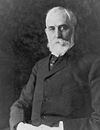 John F. Dryden John F. DrydenJohn F. Dryden John Fairfield Dryden was president of the Prudential Insurance Company and a United States Senator from New Jersey. He was known as the "father of industrial insurance".-Biography:... |
Republican Republican Party (United States) The Republican Party is one of the two major contemporary political parties in the United States, along with the Democratic Party. Founded by anti-slavery expansion activists in 1854, it is often called the GOP . The party's platform generally reflects American conservatism in the U.S... |
January 29, 1902– March 3, 1907 |
57 57th United States Congress -House of Representatives:*Democratic: 151*Republican: 200 *Populist: 5*Silver : 1TOTAL members: 357-Leadership:-Senate:* President: Theodore Roosevelt , until September 14, 1901, vacant thereafter.... (continued) |
Elected to finish Sewell's term Withdrew from election contest to full term |
|
| 58 58th United States Congress - House of Representatives :* Republican : 209 * Democratic : 176* Silver Republican : 1TOTAL members: 386-Senate:* President: Vacant* President pro tempore: William P. Frye -Members:... |
||||||
| 59 59th United States Congress The Fifty-ninth United States Congress was a meeting of the legislative branch of the United States federal government, composed of the United States Senate and the United States House of Representatives. It met in Washington, DC from March 4, 1905 to March 4, 1907, during the fifth and sixth... |
||||||
| 20 | Frank O. Briggs Frank O. Briggs Frank Obadiah Briggs was a United States Senator from New Jersey.-Biography:He was born on August 12, 1851 in Concord, New Hampshire to James F. Briggs.He attended the public schools, Francestown Academy, and Phillips Academy... |
Republican Republican Party (United States) The Republican Party is one of the two major contemporary political parties in the United States, along with the Democratic Party. Founded by anti-slavery expansion activists in 1854, it is often called the GOP . The party's platform generally reflects American conservatism in the U.S... |
March 4, 1907 – March 3, 1913 |
60 60th United States Congress The Sixtieth United States Congress was a meeting of the legislative branch of the United States federal government, composed of the United States Senate and the United States House of Representatives. It met in Washington, DC from March 4, 1907 to March 4, 1909, during the last two years of... |
21 | Elected in 1906 United States Senate elections, 1906 The United States Senate election of 1906 was an election which had the Republican Party gain three seats in the United States Senate, expanding their majority to almost twice that of the opposing Democratic Party.... Lost re-election |
| 61 61st United States Congress The Sixty-first United States Congress was a meeting of the legislative branch of the United States federal government, composed of the United States Senate and the United States House of Representatives. It met in Washington, DC from March 4, 1909 to March 4, 1911, during the first two years of... |
||||||
| 62 62nd United States Congress - House of Representatives :* Democratic : 230 * Republican : 162* Socialist : 1* Independent : 1TOTAL members: 394-Senate:* President: James S... |
||||||
| 21 | 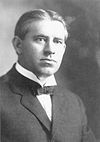 William Hughes William Hughes |
Democratic Democratic Party (United States) The Democratic Party is one of two major contemporary political parties in the United States, along with the Republican Party. The party's socially liberal and progressive platform is largely considered center-left in the U.S. political spectrum. The party has the lengthiest record of continuous... |
March 4, 1913 – January 30, 1918 |
63 63rd United States Congress - House of Representatives:*Democratic : 291 *Republican : 134*Progressive : 9*Independent : 1TOTAL members: 435-Senate:*President of the Senate: Thomas R. Marshall*President pro tempore: James P. Clarke-Senate:... |
22 | Elected in 1912 Died |
| 64 64th United States Congress The Sixty-fourth United States Congress was a meeting of the legislative branch of the United States federal government, composed of the United States Senate and the United States House of Representatives. It met in Washington, DC from March 4, 1915 to March 4, 1917, during the third and fourth... |
||||||
| 65 65th United States Congress The Sixty-fifth United States Congress was a meeting of the legislative branch of the United States federal government, composed of the United States Senate and the United States House of Representatives. It met in Washington, DC from March 4, 1917 to March 4, 1919, during the fourth and fifth... |
||||||
| Vacant | January 30, 1918 – February 23, 1918 |
|||||
| 22 | 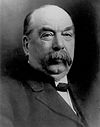 David Baird David BairdDavid Baird (New Jersey) David Baird, Sr. was a U.S. Senator from New Jersey.-Biography:A Scots-Irishman born in County Londonderry, Ireland, Baird immigrated to the United States in 1856 and entered the lumber business in Port Deposit, Maryland. He moved in 1860 to Camden, New Jersey, where he continued in the lumber... |
Republican Republican Party (United States) The Republican Party is one of the two major contemporary political parties in the United States, along with the Democratic Party. Founded by anti-slavery expansion activists in 1854, it is often called the GOP . The party's platform generally reflects American conservatism in the U.S... |
February 23, 1918 – March 3, 1919 |
65 65th United States Congress The Sixty-fifth United States Congress was a meeting of the legislative branch of the United States federal government, composed of the United States Senate and the United States House of Representatives. It met in Washington, DC from March 4, 1917 to March 4, 1919, during the fourth and fifth... (continued) |
Appointed to continue Hughes's term Elected to finish Hughes's term Retired |
|
| 23 | 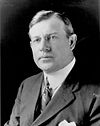 Walter Evans Edge Walter Evans EdgeWalter Evans Edge Walter Evans Edge was an American politician. A Republican, he was twice the Governor of New Jersey, from 1917 to 1919 and again from 1944 to 1947, serving as governor during both World War I and World War II... |
Republican Republican Party (United States) The Republican Party is one of the two major contemporary political parties in the United States, along with the Democratic Party. Founded by anti-slavery expansion activists in 1854, it is often called the GOP . The party's platform generally reflects American conservatism in the U.S... |
March 4, 1919 – November 21, 1929 |
66 66th United States Congress The Sixty-sixth United States Congress was a meeting of the legislative branch of the United States federal government, comprising the United States Senate and the United States House of Representatives. It met in Washington, DC from March 4, 1919 to March 4, 1921, during the last two years of... |
23 | Elected in 1918 |
| 67 67th United States Congress The Sixty-seventh United States Congress was a meeting of the legislative branch of the United States federal government, consisting of the United States Senate and the United States House of Representatives. It met in Washington, D.C. from March 4, 1921 to March 4, 1923, during the first two years... |
||||||
| 68 68th United States Congress The Sixty-eighth United States Congress was a meeting of the legislative branch of the United States federal government, consisting of the United States Senate and the United States House of Representatives. It met in Washington, D.C. from March 4, 1923 to March 4, 1925, during the last months of... |
||||||
| 69 69th United States Congress The Sixty-ninth United States Congress was a meeting of the legislative branch of the United States federal government, consisting of the United States Senate and the United States House of Representatives. It met in Washington, D.C. from March 4, 1925 to March 4, 1927, during the third and fourth... |
24 | Re-elected in 1924 Resigned to become U.S. Ambassador to France United States Ambassador to France This article is about the United States Ambassador to France. There has been a United States Ambassador to France since the American Revolution. The United States sent its first envoys to France in 1776, towards the end of the four-centuries-old Bourbon dynasty... |
||||
| 70 70th United States Congress The Seventieth United States Congress was a meeting of the legislative branch of the United States federal government, consisting of the United States Senate and the United States House of Representatives. It met in Washington, D.C. from March 4, 1927 to March 3, 1929, during the last two years of... |
||||||
| 71 71st United States Congress The Seventy-first United States Congress was a meeting of the legislative branch of the United States federal government, consisting of the United States Senate and the United States House of Representatives. It met in Washington, D.C. from March 4, 1929 to March 4, 1931, during the first two years... |
||||||
| Vacant | November 21, 1929 – November 30, 1929 |
|||||
| 24 | 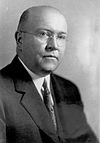 David Baird, Jr. David Baird, Jr.David Baird, Jr. David Baird, Jr. was a U.S. Senator from New Jersey.Born in Camden, New Jersey to Senator David Baird, Baird Jr. graduated from Lawrenceville School in 1899 and from Princeton University in 1903... |
Republican Republican Party (United States) The Republican Party is one of the two major contemporary political parties in the United States, along with the Democratic Party. Founded by anti-slavery expansion activists in 1854, it is often called the GOP . The party's platform generally reflects American conservatism in the U.S... |
November 30, 1929 – December 2, 1930 |
Appointed to continue Edge's term Retired when successor qualified |
||
| 25 | 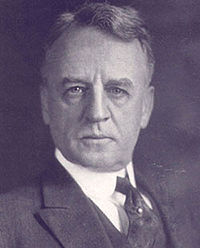 Dwight Morrow Dwight MorrowDwight Morrow Dwight Whitney Morrow was an American businessman, politician, and diplomat.-Life:Born in Huntington, West Virginia, he moved with his parents, James E. and Clara Morrow to Allegheny, Pennsylvania in 1875. His father James, was principal of Marshall College, which is now Marshall University... |
Republican Republican Party (United States) The Republican Party is one of the two major contemporary political parties in the United States, along with the Democratic Party. Founded by anti-slavery expansion activists in 1854, it is often called the GOP . The party's platform generally reflects American conservatism in the U.S... |
December 3, 1930 – October 5, 1931 |
71 71st United States Congress The Seventy-first United States Congress was a meeting of the legislative branch of the United States federal government, consisting of the United States Senate and the United States House of Representatives. It met in Washington, D.C. from March 4, 1929 to March 4, 1931, during the first two years... (continued) |
Elected to finish Edge's term | |
| 72 72nd United States Congress The Seventy-second United States Congress was a meeting of the legislative branch of the United States federal government, consisting of the United States Senate and the United States House of Representatives. It met in Washington, D.C. from March 4, 1931 to March 4, 1933, during the last two years... |
25 | Elected to full term in 1930 Died |
||||
| Vacant | October 5, 1931 – December 1, 1931 |
|||||
| 26 |  William Warren Barbour William Warren BarbourWilliam Warren Barbour William Warren Barbour was an American Republican Party politician who represented New Jersey in the United States Senate from 1931 to 1937 and again from 1938 until his death in office in 1943... |
Republican Republican Party (United States) The Republican Party is one of the two major contemporary political parties in the United States, along with the Democratic Party. Founded by anti-slavery expansion activists in 1854, it is often called the GOP . The party's platform generally reflects American conservatism in the U.S... |
December 1, 1931 – January 3, 1937 |
72 72nd United States Congress The Seventy-second United States Congress was a meeting of the legislative branch of the United States federal government, consisting of the United States Senate and the United States House of Representatives. It met in Washington, D.C. from March 4, 1931 to March 4, 1933, during the last two years... (continued) |
Appointed to continue Morrow's term Elected to finish Morrow's term Lost re-election |
|
| 73 73rd United States Congress The Seventy-third United States Congress was a meeting of the legislative branch of the United States federal government, composed of the United States Senate and the United States House of Representatives. It met in Washington, DC from March 4, 1933 to January 3, 1935, during the first two years... |
||||||
| 74 74th United States Congress -House:Also 2 Delegates, 3 Resident Commissioners-Senate:*President of the Senate: John N. Garner *President pro tempore: Key Pittman -Majority leadership:*Majority leader: Joseph T. Robinson... |
||||||
| Vacant | January 3, 1937 – April 15, 1937 |
75 75th United States Congress The Seventy-fifth United States Congress was a meeting of the legislative branch of the United States federal government, composed of the United States Senate and the United States House of Representatives. It met in Washington, DC from January 3, 1937 to January 3, 1939, during the first two years... |
26 | |||
| 27 | William H. Smathers William H. Smathers William Howell Smathers was a Democratic United States Senator from New Jersey, serving from 1937 to 1943.-Biography:... |
Democratic Democratic Party (United States) The Democratic Party is one of two major contemporary political parties in the United States, along with the Republican Party. The party's socially liberal and progressive platform is largely considered center-left in the U.S. political spectrum. The party has the lengthiest record of continuous... |
April 15, 1937 – January 3, 1943 |
75 75th United States Congress The Seventy-fifth United States Congress was a meeting of the legislative branch of the United States federal government, composed of the United States Senate and the United States House of Representatives. It met in Washington, DC from January 3, 1937 to January 3, 1939, during the first two years... (Continued) |
Elected in 1936, but installed late, remaining until then a member of the state Senate |
|
| 76 76th United States Congress The Seventy-sixth United States Congress was a meeting of the legislative branch of the United States federal government, composed of the United States Senate and the United States House of Representatives. It met in Washington, DC from January 3, 1939 to January 3, 1941, during the seventh and... |
||||||
| 77 77th United States Congress -Major events:* December 7, 1941: Attack on Pearl Harbor* December 8, 1941: Joint Session of Congress met to hear President Roosevelt deliver his "Day of Infamy" speech... |
||||||
| 27 | 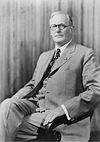 Albert W. Hawkes Albert W. HawkesAlbert W. Hawkes Albert Wahl Hawkes was a United States Senator from New Jersey.-Studies:He was born in Chicago on November 20, 1878. He attended the public schools and graduated from Chicago College of Law in 1900, gaining admission to the bar the same year... |
Republican Republican Party (United States) The Republican Party is one of the two major contemporary political parties in the United States, along with the Democratic Party. Founded by anti-slavery expansion activists in 1854, it is often called the GOP . The party's platform generally reflects American conservatism in the U.S... |
January 3, 1943 – January 3, 1949 |
78 78th United States Congress The Seventy-eighth United States Congress was a meeting of the legislative branch of the United States federal government, composed of the United States Senate and the United States House of Representatives. It met in Washington, DC from January 3, 1943 to January 3, 1945, during the last two years... |
27 | Elected in 1942 |
| 79 79th United States Congress The Seventy-ninth United States Congress was a meeting of the legislative branch of the United States federal government, composed of the United States Senate and the United States House of Representatives. It met in Washington, DC from January 3, 1945 to January 3, 1947, during the last months of... |
||||||
| 80 80th United States Congress The Eightieth United States Congress was a meeting of the legislative branch of the United States federal government, composed of the United States Senate and the United States House of Representatives. It met in Washington, DC from January 3, 1947 to January 3, 1949, during the third and fourth... |
||||||
| 28 | 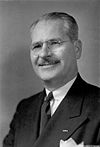 Robert C. Hendrickson Robert C. HendricksonRobert C. Hendrickson Robert Clymer Hendrickson was a United States Senator from New Jersey.-Biography:Born in Woodbury, New Jersey, he attended public schools and during the First World War enlisted in the United States Army in 1918 and served overseas... |
Republican Republican Party (United States) The Republican Party is one of the two major contemporary political parties in the United States, along with the Democratic Party. Founded by anti-slavery expansion activists in 1854, it is often called the GOP . The party's platform generally reflects American conservatism in the U.S... |
January 3, 1949 – January 2, 1955 |
81 81st United States Congress The Eighty-first United States Congress was a meeting of the legislative branch of the United States federal government, composed of the United States Senate and the United States House of Representatives... |
28 | Elected in 1948 |
| 82 82nd United States Congress The Eighty-second United States Congress was a meeting of the legislative branch of the United States federal government, composed of the United States Senate and the United States House of Representatives. It met in Washington, DC from January 3, 1951 to January 3, 1953, during the last two years... |
||||||
| 83 83rd United States Congress The Eighty-third United States Congress was a meeting of the legislative branch of the United States federal government, composed of the United States Senate and the United States House of Representatives. It met in Washington, DC from January 3, 1953 to January 3, 1955, during the first two years... |
||||||
| 29 | 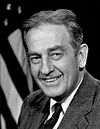 Clifford P. Case Clifford P. CaseClifford P. Case Clifford Philip Case was an American lawyer and Republican Party politician who represented in the United States House of Representatives and the State of New Jersey in the United States Senate .-Biography:Clifford P. Case was born in Franklin Park in Somerset County, New Jersey... |
Republican Republican Party (United States) The Republican Party is one of the two major contemporary political parties in the United States, along with the Democratic Party. Founded by anti-slavery expansion activists in 1854, it is often called the GOP . The party's platform generally reflects American conservatism in the U.S... |
January 3, 1955 – January 3, 1979 |
84 84th United States Congress The Eighty-fourth United States Congress was a meeting of the legislative branch of the United States federal government, composed of the United States Senate and the United States House of Representatives. It met in Washington, DC from January 3, 1955 to January 3, 1957, during the third and... |
29 | Elected in 1954 |
| 85 85th United States Congress The Eighty-fifth United States Congress was a meeting of the legislative branch of the United States federal government, composed of the United States Senate and the United States House of Representatives. It met in Washington, DC from January 3, 1957 to January 3, 1959, during the fifth and sixth... |
||||||
| 86 86th United States Congress The Eighty-sixth United States Congress was a meeting of the legislative branch of the United States federal government, composed of the United States Senate and the United States House of Representatives. It met in Washington, DC from January 3, 1959 to January 3, 1961, during the last two years... |
||||||
| 87 87th United States Congress -House of Representatives :-Senate:* President: Richard Nixon , until January 20, 1961** Lyndon Johnson , from January 20, 1961* President pro tempore: Carl Hayden -House of Representatives:... |
30 | Re-elected in 1960 | ||||
| 88 88th United States Congress The Eighty-eighth United States Congress was a meeting of the legislative branch of the United States federal government, composed of the United States Senate and the United States House of Representatives. It met in Washington, DC from January 3, 1963 to January 3, 1965, during the last year of... |
||||||
| 89 89th United States Congress -House of Representatives:- Senate :* President of the Senate: Hubert Humphrey , starting January 20, 1965* President pro tempore: Carl Hayden - Majority leadership :* Majority Leader and Democratic Conference Chairman: Mike Mansfield... |
||||||
| 90 90th United States Congress The Ninetieth United States Congress was a meeting of the legislative branch of the United States federal government, composed of the United States Senate and the United States House of Representatives. It met in Washington, DC from January 3, 1967 to January 3, 1969, during the last two years of... |
31 | Re-elected in 1966 | ||||
| 91 91st United States Congress The Ninety-first United States Congress was a meeting of the legislative branch of the United States federal government, composed of the United States Senate and the United States House of Representatives. It met in Washington, DC from January 3, 1969 to January 3, 1971, during the first two years... |
||||||
| 92 92nd United States Congress The Ninety-second United States Congress was a meeting of the legislative branch of the United States federal government, composed of the United States Senate and the United States House of Representatives... |
||||||
| 93 93rd United States Congress The Ninety-third United States Congress was a meeting of the legislative branch of the United States federal government, composed of the United States Senate and the United States House of Representatives. It met in Washington, DC from January 3, 1973 to January 3, 1975, during the end of Richard... |
32 | Re-elected in 1972 |
||||
| 94 94th United States Congress The Ninety-fourth United States Congress was a meeting of the legislative branch of the United States federal government, composed of the United States Senate and the United States House of Representatives. It met in Washington, DC from January 3, 1975 to January 3, 1977, during the administration... |
||||||
| 95 95th United States Congress The Ninety-fifth United States Congress was a meeting of the legislative branch of the United States federal government, composed of the United States Senate and the United States House of Representatives. It met in Washington, DC from January 3, 1977 to January 3, 1979, during the first two years... |
||||||
| 30 | .jpg) Bill Bradley Bill BradleyBill Bradley William Warren "Bill" Bradley is an American hall of fame basketball player, Rhodes scholar, and former three-term Democratic U.S. Senator from New Jersey. He ran unsuccessfully for the Democratic Party's nomination for President in the 2000 election.Bradley was born and raised in a suburb of St.... |
Democratic Democratic Party (United States) The Democratic Party is one of two major contemporary political parties in the United States, along with the Republican Party. The party's socially liberal and progressive platform is largely considered center-left in the U.S. political spectrum. The party has the lengthiest record of continuous... |
January 3, 1979 – January 3, 1997 |
96 96th United States Congress The Ninety-sixth United States Congress was a meeting of the legislative branch of the United States federal government, composed of the United States Senate and the United States House of Representatives. It met in Washington, DC from January 3, 1979 to January 3, 1981, during the last two years... |
33 | Elected in 1978 |
| 97 97th United States Congress The Ninety-seventh United States Congress was a meeting of the legislative branch of the United States federal government, composed of the United States Senate and the United States House of Representatives. It met in Washington, DC from January 3, 1981 to January 3, 1983, during the final weeks of... |
||||||
| 98 98th United States Congress The Ninety-eighth United States Congress was a meeting of the legislative branch of the United States federal government, composed of the United States Senate and the United States House of Representatives. It met in Washington, DC from January 3, 1983 to January 3, 1985, during the third and... |
||||||
| 99 99th United States Congress The Ninety-ninth United States Congress was a meeting of the legislative branch of the United States federal government, composed of the United States Senate and the United States House of Representatives. It met in Washington, DC from January 3, 1985 to January 3, 1987, during the fifth and sixth... |
34 | Re-elected in 1984 | ||||
| 100 100th United States Congress -House of Representatives:- Senate :* President: George H.W. Bush * President pro tempore: John Stennis - Majority leadership :* Majority Leader, Democratic Conference Chairman, and Democratic Policy Committee Chairman: Robert Byrd... |
||||||
| 101 101st United States Congress The One Hundred First United States Congress was a meeting of the legislative branch of the United States federal government, composed of the United States Senate and the United States House of Representatives. It met in Washington, DC from January 3, 1989 to January 3, 1991, during the first two... |
||||||
| 102 102nd United States Congress -House of Representatives:- Senate :* President:Dan Quayle * President pro tempore: Robert Byrd - Majority leadership :* Majority Leader: George Mitchell* Majority Whip: Wendell Ford- Minority leadership :... |
35 | Re-elected in 1990 United States Senate election in New Jersey, 1990 The 1990 New Jersey United States Senate election was held on November 6, 1990 to select the U.S. Senator from the state of New Jersey. Democratic Senator Bill Bradley decided to seek re-election and narrowly edged out little-known Republican Christine Todd Whitman.-Republican Party:*Christine... Retired |
||||
| 103 103rd United States Congress - House of Representatives :- Leadership :- Senate :* President: Dan Quayle , until January 20, 1993** Al Gore , from January 20, 1993* President pro tempore: Robert Byrd - Majority leadership :* Majority Leader: George Mitchell... |
||||||
| 104 104th United States Congress The One Hundred Fourth United States Congress was a meeting of the legislative branch of the United States federal government, composed of the United States Senate and the United States House of Representatives. It met in Washington, DC from January 3, 1995 to January 3, 1997, during the third and... |
||||||
| 31 |  Robert Torricelli Robert TorricelliRobert Torricelli Robert Guy Torricelli , nicknamed "the Torch," is an American politician from the U.S. state of New Jersey. Torricelli, a Democrat, served 14 years in the U.S. House of Representatives before being elected to the U.S. Senate... |
Democratic Democratic Party (United States) The Democratic Party is one of two major contemporary political parties in the United States, along with the Republican Party. The party's socially liberal and progressive platform is largely considered center-left in the U.S. political spectrum. The party has the lengthiest record of continuous... |
January 3, 1997 – January 3, 2003 |
105 105th United States Congress The One Hundred Fifth United States Congress was a meeting of the legislative branch of the United States federal government, composed of the United States Senate and the United States House of Representatives. It met in Washington, DC from January 3, 1997 to January 3, 1999, during the fifth and... |
36 | Elected in 1996 United States Senate election in New Jersey, 1996 The 1996 United States Senate election in New Jersey was held on November 6, 1996. Incumbent Democratic U.S. Senator Bill Bradley decided to retire instead of seeking a fourth term.-Candidates:*Dick Zimmer, U.S... Retired |
| 106 106th United States Congress The One Hundred Sixth United States Congress was a meeting of the legislative branch of the United States federal government, composed of the United States Senate and the United States House of Representatives. It met in Washington, DC from January 3, 1999 to January 3, 2001, during the last two... |
||||||
| 107 107th United States Congress The One Hundred Seventh United States Congress was a meeting of the legislative branch of the United States federal government, composed of the United States Senate and the United States House of Representatives. It met in Washington, D.C. from January 3, 2001 to January 3, 2003, during the final... |
||||||
| 32 | Frank Lautenberg Frank Lautenberg Frank Raleigh Lautenberg is the senior United States Senator from New Jersey and a member of the Democratic Party. Previously, he was the Chairman and Chief Executive Officer of Automatic Data Processing, Inc.-Early life, career, and family:... |
Democratic Democratic Party (United States) The Democratic Party is one of two major contemporary political parties in the United States, along with the Republican Party. The party's socially liberal and progressive platform is largely considered center-left in the U.S. political spectrum. The party has the lengthiest record of continuous... |
January 3, 2003 – Present |
108 108th United States Congress The One Hundred Eighth United States Congress was the legislative branch of the United States federal government, composed of the United States Senate and the United States House of Representatives from January 3, 2003 to January 3, 2005, during the third and fourth years of George W. Bush's... |
37 | Elected in 2002 United States Senate election in New Jersey, 2002 The 2000 United States Senate election in New Jersey was held on November 5, 2002. Incumbent Democratic U.S. Senator Robert Torricelli decided to retire. Democrat Frank Lautenberg won the open seat.- Campaign :... |
| 109 109th United States Congress The One Hundred Ninth United States Congress was the legislative branch of the United States, composed of the United States Senate and the United States House of Representatives, from January 3, 2005 to January 3, 2007, during the fifth and sixth years of George W. Bush's presidency. House members... |
||||||
| 110 110th United States Congress The One Hundred Tenth United States Congress was the meeting of the legislative branch of the United States federal government, between January 3, 2007, and January 3, 2009, during the last two years of the second term of President George W. Bush. It was composed of the Senate and the House of... |
||||||
| 111 111th United States Congress The One Hundred Eleventh United States Congress was the meeting of the legislative branch of the United States federal government from January 3, 2009 until January 3, 2011. It began during the last two weeks of the George W. Bush administration, with the remainder spanning the first two years of... |
38 | Re-elected in 2008 United States Senate election in New Jersey, 2008 The 2008 United States Senate election in NJ was held on November 4, 2008. Incumbent Democratic U.S. Senator Frank Lautenberg won re-election to a fourth, non-consecutive term.-Background:... |
||||
| 112 112th United States Congress The One Hundred Twelfth United States Congress is the current meeting of the legislative branch of the United States federal government, composed of the United States Senate and the United States House of Representatives. It convened in Washington, D.C. on January 3, 2011, and will end on January... |
||||||
| 113 113th United States Congress The One Hundred Thirteenth United States Congress will be the next meeting of the legislative branch of the United States federal government after the 112th Congress is seated. It will be composed of the United States Senate and the United States House of Representatives. It is scheduled to meet... |
||||||
| # | Senator | Party | Years | Congress | Term | Electoral history |
See also
- List of United States Representatives from New Jersey
- United States congressional delegations from New JerseyUnited States Congressional Delegations from New JerseyThese are tables of congressional delegations from New Jersey to the United States Senate and United States House of Representatives. -United States Senate:-United States House of Representatives:-Sources:* *...

